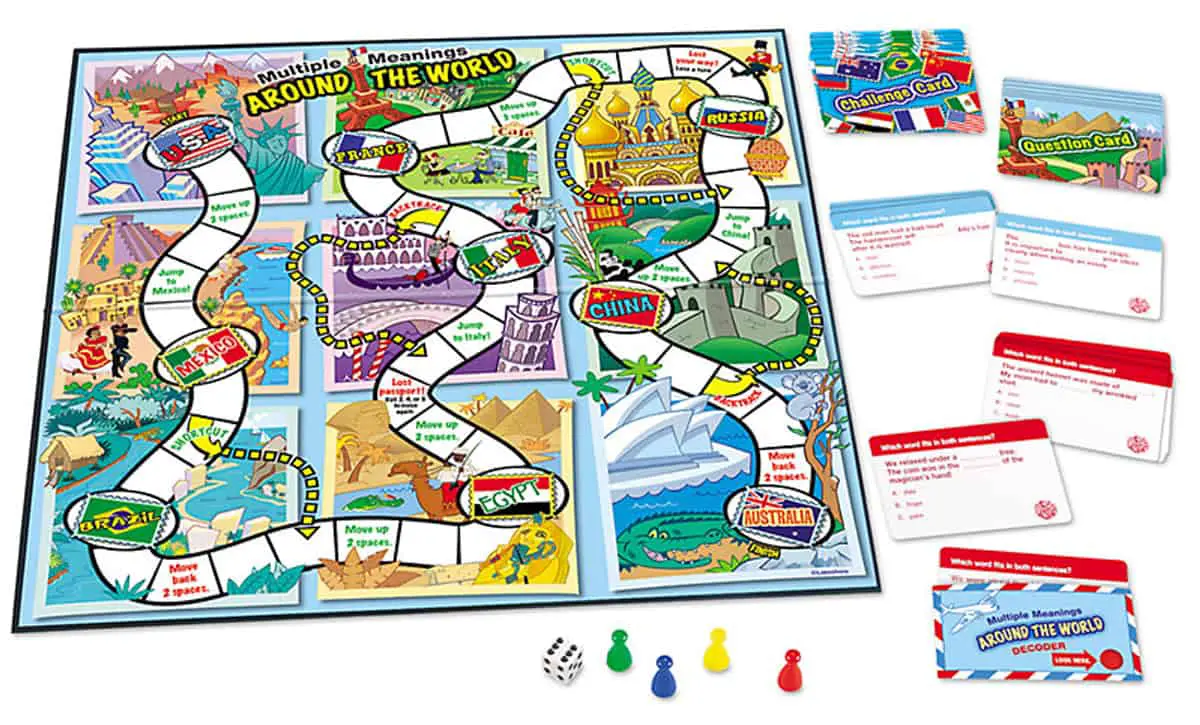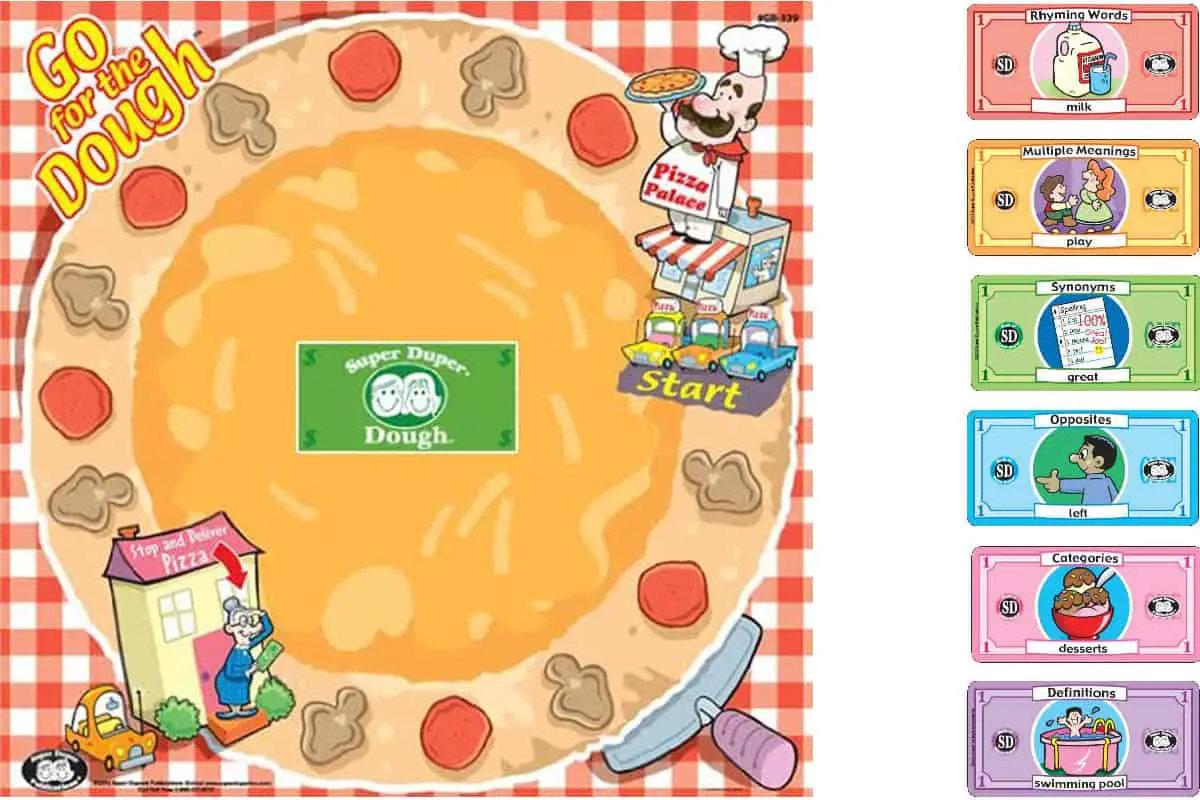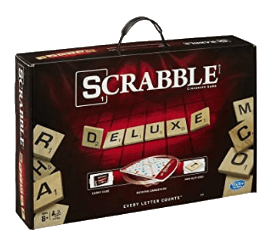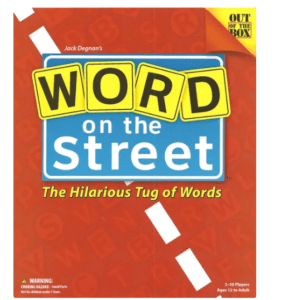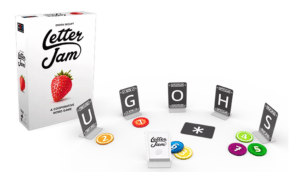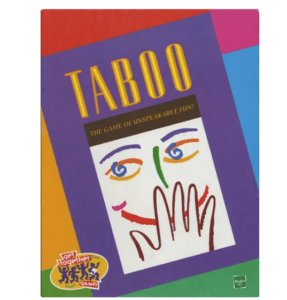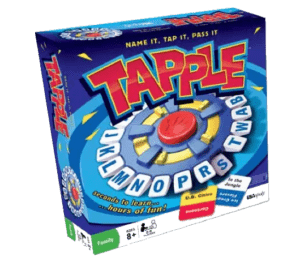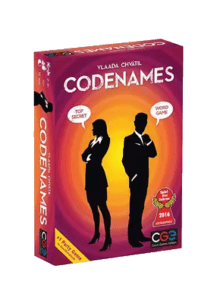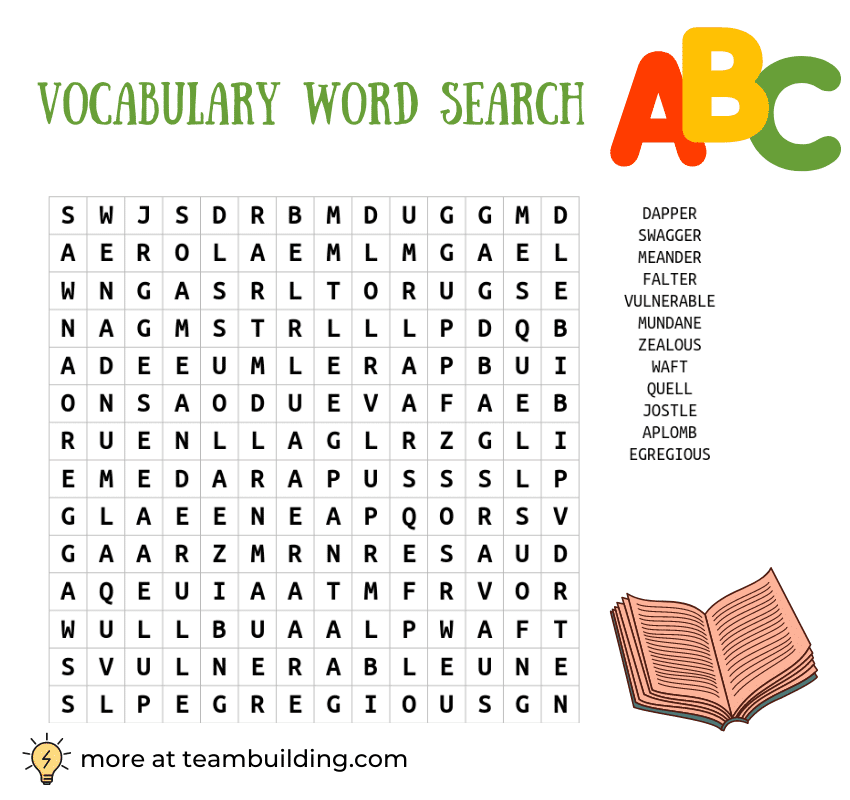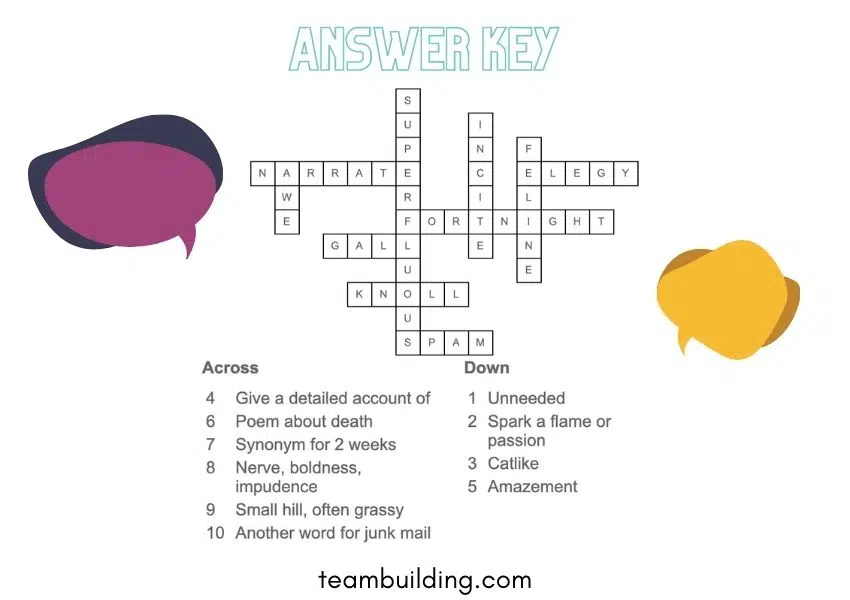There might be affiliate links on this page, which means we get a small commission of anything you buy. As an Amazon Associate we earn from qualifying purchases. Please do your own research before making any online purchase.
Are you a word geek
looking for new word board games to play?
Or are you simply
searching for something new to amuse you and your friends on game night?
Perhaps are you a parent
seeking games for your partner and kids that are both educational and entertaining?
If so, you have landed
on the right page! In this post, we share the 9 best word board games for you and the crew. We picked these games
based on the number of positive reviews and high ratings they got from
satisfied consumers.
Instead of mindlessly
scrolling through your social media accounts and wasting valuable time, it’s
probably time to consider other hobbies like playing board games. You’ll might
be surprised how much this activity can be beneficial to your soul, mind, and body.
Without further ado, let’s check out our list of the best word board games!
1. Bananagrams
Bananagrams is an excellent choice for parents who are looking to play
word board games with their children. In addition to fun and entertainment, this anagram game promises an
educational experience for kids, especially those who are starting to learn
more complex words.
The rules are simple and
easy to understand. First, you need to distribute the tiles among all players
(maximum of eight players) facedown—21 tiles each for two to four players; 15
tiles each for five to six players; and, 11 tiles each for seven to eight
players. Start the game by saying “Split!” and everyone turns their tiles over.
The objective of this
game is to be the first person to use all their letters. You may form words
horizontally from left to right, or vertically from top to bottom. You may also
rearrange your grid any time you want. After placing your last letter in your
grid, call out “Peel!” and everyone has to take another tile from the “Bunch.”
One rule to remember is
that you can put one of your letters back, face-down in the Bunch, by saying “Dump!”
However, you have to take three more tiles in exchange for that one letter. You
may do as many “dumps” as you like.
Whoever is the first
person to use all their letters once the Bunch is empty is the winner. But he
has to shout “Bananas!” to let the others know. The competitors should then
inspect his grid to see if there are misspelled words, proper nouns, or any
other unacceptable words. If there are, then they have to shout “Rotten
Banana!” to kick the false winner out of the game.
Pros
- Has fast-paced gameplay, and you can have as many rounds as you like.
- An excellent game for anyone, whether kids, teens, or adults.
- Suitable for multiple players or solo gaming.
Cons
- Choose your seller wisely, as fake sellers deliver tiles in poor conditions.
2. Quiddler
If you are looking for a fast-paced, short-duration word board game,
then Quiddler is the answer. This
game exercises both your vocabulary and spelling skills, and is most suitable
for children six years old and above. There can be 1 to 10 players, and the one
with the highest score at the end of the game is the winner.
In this game, each
player is required to create words from the cards in their hands. You have to
be cautious, however, since the number of cards increases every round. There
are eight rounds to deal with, and you can have as many as 10 cards on the last
round. Every card has its corresponding value, so if you have the most number
of words formed with high-value cards by the end of the game, you will have the
most number of points.
This word board game
allows you to form even the simplest of words like “at,” “of,” “zoo,” and a lot
more. This is why it is recommended to kids. There are bonuses, too. For
instance, the player with the most words formed and the player who forms the
longest word get additional points. In the case of a tie, no one receives the
bonus points.
Quiddler has a high
rating on online stores, with almost a perfect store, as well as lots of
positive feedback. If you are looking for a game you can play with your
children, then we highly recommend this one.
Pros
- Although designed to be fast, you can play the game at your own pace.
- Award-winning word board game; tried and tested by expert players.
- Makes a perfect gift for friends or family members who like word games.
Cons
- Some customers do not recommend the dictionary that comes with it.
3. Hasbro Scrabble
The game Scrabble was created
by Alfred Mosher Butts in 1938, and since then has became a popular way to
spend fun nights with friends, colleagues, and family members.
This particular version
of Scrabble is from Hasbro Gaming, which is one of the largest companies in the
world that makes toys and other means of entertainment. The goal of the game is
to form words on the board and gain points.
For every tile you use
to create a word, you have to draw a replacement from the bag. The game ends
once there are no more tiles, and the player with the most number of points
wins. To determine who has the most points, you’ll have to record your score on
each turn with pen and paper, and then add them up at the end.
Scrabble may be played
solo, with two to three players, or with a group of friends. You need a bit of
luck, as you have to draw tiles blindly, but the game also rewards those with
good strategy and extensive vocabularies.
Pros
- Traditional, classic board game; instructions may be found anywhere.
- Beneficial for small kids and older people for brain development and memory retention;
- Improves not just vocabulary, but also strategic and critical thinking.
Cons
- You must have outstanding vocabulary skills to win this game.
- Paper and pen are needed to record your scores.
4. Big Boggle
Big Boggle is an excellent choice for those seeking a word game with a
bit of pressure. The goal of
the game is to list as many words as you can from the randomly assorted letters
given to you at the start. However, you only have three minutes to do so, which
means you have to think and write quickly.
This board game comes with
25 standard letter cubes, one double letter cube, a cube grid with a dome, and
a three-minute sand timer. At the beginning of the game, each player takes a
pen/pencil and paper to list their words. The cube grid is then prepared by
shaking the cubes until they fall into place.
Once the timer starts,
all players should use the assorted letters and come up with words of four or
more letters. Write down every word you can think of until the time runs out.
Words must be formed from adjoining letters on the grid.
When the timer stops,
all players compare their lists of words with one another. All words that have
been played by multiple people are not scored. The remaining words are scored,
the one who earns the most points is the winner.
Pros
- Game mechanics are easy to learn and understand.
- Artwork and design are nice and pleasant.
- The element of time and pressure makes the game more exciting.
Cons
- Some word combinations are complicated for children (and even some adults).
5. Tapple
Tapple is a fast-paced word board game that is most suitable for
families who like playing games during holidays, parties, and family
gatherings. It is also easy to
store and carry, and therefore can be packed during vacations, trips, and long
getaways.
This board game comes
with a portable Tapple wheel and 36 topic cards with 144 categories. The goal
is simple: You have to produce an answer to the category cards using only the letters
available on the wheel. Aim to be the last player left in each round to get a
score, then collect three topic cards and you win.
Tapple is a
time-pressure and elimination game. You only have 10 seconds to answer every
round, and if you fail to do so, you get kicked out for that round. If you give
an answer that does not match the category, you get eliminated. The last person
standing gains the point and is declared the winner for that round.
Remember that when you
give your answer, you have to press the first letter of the word and then reset
the timer to pass the turn. Otherwise, you are disqualified. Likewise, keep in
mind that once a letter has been used, the others can no longer press that
letter for that round.
Pros
- Provides a fun and entertaining way for kids to learn new words.
- Equally exciting for adults and experienced players.
- An excellent word board game to give as a Christmas or birthday gift.
Cons
- Some customers report that the timer is too loud and annoying.
- Could have been better if there were a different tie-breaker.
6. Word on the Street
If you are searching for a very competitive word board game, then you
should include this one on your list. Word on the Street is a tug-of-words type of game where each team fights
for its desired letters to form high-scoring words. The first team to get the
eight letter tiles becomes the winner.
There are two teams in
this game, and they take turns “on the street,” or on the board. The letter
tiles are put in their corresponding place on the middle lane of the board
called the “Median Strip.” There are different rules with regard to turns, but
the main objective is to capture all eight letter tiles before the other team
does.
The key to winning this
game is to brainstorm with your teammates while the other team is making its
move. You all must agree on one word, and pull the letters of that word closer
to your side of the street before time runs out, and before the other team does
the same. Word on the Street is not just a vocabulary game, but also a game of
speed and strategy.
Pros
- Allows you to use more strategy than other word board games.
- The race element of the game makes it more fun and challenging.
- Builds camaraderie and teamwork among team members.
Cons
- Might not be fun enough for people in small groups (or if played alone or by two players).
- Rules might be too complicated for small children.
7. Pairs in Pears
Pairs in Pears is somewhat similar to Bananagrams, so if you are looking
for an alternative to the latter, then this word board game is a good fit. In this game, the goal is to make as many
pairs as possible, but they have to be matching suits.
The game comes with 104
tiles, and the number of tiles you can take depends on the number of players
there are. Similarly, the number of pairs needed to win also depends on the
number of players. There are, however, other ways to play this game, and they
are all explained in the game’s guide.
Pairs in Pears is a
racing and counting game in which you try to be the first to produce as many as
possible pairs with matching suits. It is a great way for children (and adults)
to improve their memory retention and cognitive skills, and is also a means to
develop pattern recognition and vocabulary.
Pros
- Fun and engaging, even for very young children.
- Game components are made of high-quality materials.
- Good game for mind stimulation, especially among children and older people.
Cons
- Some customers think that it is only best for two to three players.
- Others report that the rulebook needs to be more comprehensive.
8. Dabble
If you are a fast thinker and can come up with an answer in less than a
minute, then Dabble might be the word board game for you. This game tests not just your vocabulary skills,
but also your speed and agility.
The board game includes
all the letters of the Spanish and English alphabets, so it can be played in
both languages. It is appropriate for two to four players, ages 10 years old
and up, and you can even play it in teams.
The rules of the game
are simple. All players must pick 20 tiles from the bag without looking, and
then place their tiles face down. When the game starts, they all turn their
tiles and start the timer, then create five words (a two-letter word,
three-letter word, four-letter word, five-letter word, and six-letter word).
Points are recorded every round, and the first to reach 500 points is the
winner.
Other players may
challenge words if they have been misspelled or if they are not words at all.
You will need to have a dictionary on hand for challenges. Unlike Scrabble,
however, some words (e.g., foreign words, archaic words, colloquial words,
etc.) are accepted in Dabble.
Pros
- Greatly enhances your quick-thinking abilities.
- Challenging enough for both kids and adults.
- Available in two languages: English and Spanish.
Cons
- The game manufacturer could develop more rules to add excitement.
9. Upwords
Upwords is a great game
if you are searching for a high-stacking, word-building game. In this game, you
don’t just think of words to form, but you also stack tiles to change words.
Your score is not based solely on the number of words you form, but also on the
level of tiles you stack—the higher you stack, the higher your score is.
Similar to Scrabble, the
game begins by each player drawing seven tiles from the bag. The first player
starts the game by placing a word on the board, and then drawing new tiles from
the bag. Every player who comes next forms a word by adding letters to the
previous tiles on the board.
Unlike Scrabble,
however, you can place your letters on top of the other letters that are
already on the board. For instance, if the word is “HAT,” you can use the
letters T, R, E, S, and S to add to the end of the word, and then cover H with
M to form the word “MATTRESS.”
There are a few other rules
to consider in this game that are not in Scrabble. One example is the points
system, as Upwords’ letter tiles all have one point each. There are also no
double or triple letter word scores for additional points.
If you are looking for a
Scrabble-like game with a bit of a twist, you might want to consider checking
out this game.
Pros
- Game mechanics are easy to learn and understand.
- Similar to Scrabble, with a bit of twist.
- Offers intense, strategic, unique wordplay.
Cons
- Could have been better if the scoring were more interesting.
- Choose your seller wisely, as fake sellers deliver low-quality games.
Final Thoughts on Word and Vocabulary Board Games
We highly recommend
these word board games for those who are looking for a bit of fun and a great
way to help their children learn. After all, these types of games have shown to
be beneficial for a person’s brain development and cognitive skills. And while
your children are learning and having fun, you get to be a part of their
experience.
We also suggest these
games for those who have gotten tired of playing the usual mystery, roleplaying, and deck-building board games. You might want to try changing the flavor of
your game night and see how well you do in other types of board games.
Whatever your reason is
for checking out this post, we hope that we were able to help you find a game
that suits your tastes.
Have you already tried
playing one or more of these board games?
Let us know which one by
sharing your story in the comment fields below. We’d love to hear about your
experience!
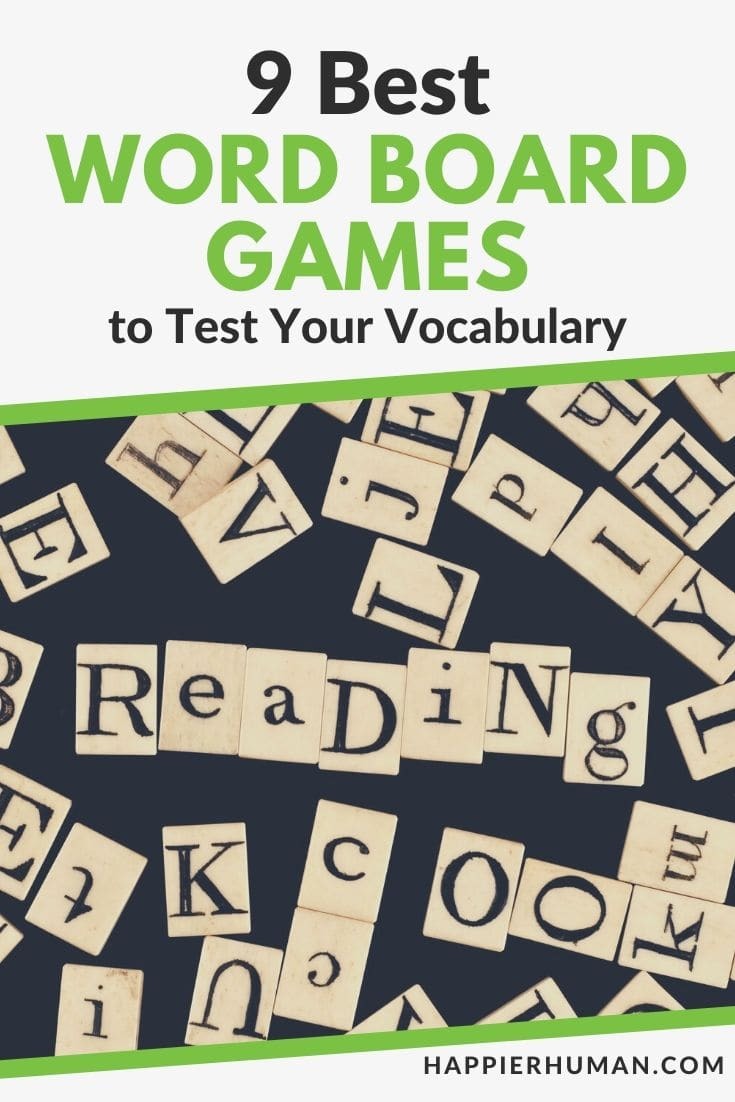
10000+ результатов для ‘board games vocabulary’
3F Questions about games Solutions Pre-Intermediate
Откройте поле
adults
kids
teenagers
teens
determiners
english
grammar
quantifiers
solutions
Speaking
unit 3
vocabulary
3F
English
many much
pre-intermediate
Questions
solutions
solutions pre-intermediate
speaking activity
unit 3
Video games
Pillow sleeping
Сопоставить
5-й класс
Начальная школа / начальная
Средняя школа
English
Games
Board game
Перевернуть плитки
English
English file elementary
GUESS WHO board
Перевернуть плитки
adjectives
Chinese
English
English
HSK
appearance
possessive adjective
Question words
Questions
Short answers
Вопросительные слова
If you’re a wordsmith, a word-wiz, or just enjoy a little wordplay, these word board games are right up your vocabulary alley. Word board games can be used as an educational tool, as a hilarious party game, or simply as a way to keep your wordy wits about you. If you’re not into word games, don’t fret, word unscrambling tools can give you an assist in any word game while improving your vocabulary.
So on-words and up-words, here are our top 20 best word board games!
Like Word Games? Why not also check out our list of Puzzle Games and Trivia Games that keep you mentally active, while still having fun?
🏆 Our Top Picks for Best Word Board Games
In a hurry? Take a quick peek before you go.
Best Team
4.0
Best Quick
3.8
Best Overall
4.2
04/11/2023 05:30 pm GMT
When I Dream
Players: 4-10
Playing time: 20-40 min
Put on your sleep masks and try to decipher your dreams!
When we fall asleep and enter a dream world, the imagination and imagery can be truly magical. When I Dream turns players into dreamers. Be careful when entering the magical world of dreams because the Dream Spirits want to have fun!
When I Dream is an innovative game that puts a focus on creativity and player imagination. Put on your sleep mask and try to interpret the Dream Spirits messages. With fairies, naughty spirits, and even the Boogeyman, the game has an array of characters that make it challenging and that give the game depth.
This is an excellent fast-paced party game that’ll have you storytelling before the Boogeyman wreaks havoc!
What we liked
When I Dream offers some new unique mechanics that give the word game genre something to think about. Combine that with the gorgeous artwork and you get a really pretty and fun game.
What could be better
With the timer included, it can rapidly descend into chaos.
Werewords
Players: 4-10
Playing time: 10 min
Guess the magic word!
In Werewords, players must guess a secret word by asking ‘yes’ or ‘no’ questions. Be careful, time catches up to you! Like in most games, there’s always a villain looming and trying to interrupt play. In Werewords, one player is secretly a werewolf.
Not only is this player working against you, but they also know the Magic Word. Even if you don’t guess the word in time, you still have the chance of exposing the werewolf and winning the game!
What’s cool about this word game is that it comes with an iOS/Android app that’ll provide thousands of words in hundreds of categories giving the game-high replayability.
What we liked
It’s like One Night Ultimate Werewolf but combined with a word game. It’s a weird combination that seems to work very well.
What could be better
Like the original Werewolf, Werewords suffers from similar role management. There are only a handful of roles that are really fun to play, but most players end up as villagers.
Will you figure out the word or will the werewolf get you? Better get your top wordsmith on the case.
Trapwords
Players: 4-8
Playing time: 30-45 min
You know the secret word your teammates must guess. You’ll give clues to help but the other team has other plans in mind. They’ve set a list of ‘trapwords’. You can’t say them or you’ll end up trapped in dungeons with terrifying monsters. Easy enough? Oh, there’s also a time limit.
Trap words is a fast-paced party game that seems like a simple task of giving clues but gets more challenging by not knowing which words can be said.
If you’re looking for a word game with a fantasy theme, Trapwords takes you into the fantasy world of dungeons and monsters.
What we liked
Trapwords is a fun fantasy variation of Taboo. The rules are changed enough to make it more interesting to play than Taboo.
What could be better
The timer can be tricky, especially for younger players.
Decrypto
Players: 3-8
Playing time: 15-45 min
Decrypto has a fun vintage aesthetic, surely making it a favorite among the hipster community. But really, this word game blends decoding and player interaction through interesting mechanics.
In this game, teammates try to transmit secret codes without letting the opposing team intercept them. Using clever graphic anaglyph components, players slide cards into the screens to decode the words.
The communication limits make Decrypto a fun and challenging word game to play, plus you’ll feel like a code breaker sending secret messages.
What we liked
The option to guess the other team’s words and clues adds another level to a fun word game.
What could be better
I’m not sure why, but I had trouble with Decrypto’s rules. It took me far longer than it should have to understand everything and teach it to my gaming group. It could have just been me, but it did give me trouble.
Letter Jam
Players: 2–6
Playing time: 45 min
Your friend gives the clue. Can you guess your secret letter?
Letter Jam is a cooperative word game where players work together to compose meaningful words from letters around the table. But the twist is only the other players can see your letter cards, not you.
Letter Jam combines team-based play and players’ deduction skills. Pull together as a team, find the clues, and reap the fruits of cooperation!
Jam out at the next game night and decipher the codes!
What we liked
Under its simple exterior, Letter Jam offers a cerebral word game that delivers more gameplay the longer you play.
What could be better
It’s played best with more players and is all but obsolete at 2-players.
Bananagrams
Players: 1-8
Playing time: 15 mins
A fun game for everyone that’ll drive you bananas.
Gather your friends and family and race against each other to build crossword grids. Bananagrams is an educational and entertaining game with which you can teach kids how to spell words all while having fun at the same time.
In Bananagrams, players have to build their words with letters as fast as they possibly can. A race to finish, speed, and a great vocabulary make the game super exciting.
What we liked
The game is in a case that’s shaped like an actual banana, making it a great travel game. It can fit in any bag and it comes in a cute package. What’s not to like?
What could be better
If you have trouble with words then the real-time movements and actions can be tricky to deal with.
Blank Slate
Players: 3-8
Playing time: 20-35 min
The game where great minds think alike.
Blank Slate is a game of predictions. “The game where great _ _ _ _ _ think alike!” Easy to learn and quick to play makes Blank Slate a fun game for all levels.
By picking a word cue card, you’ll write which word you think best completes a phrase. To take this a step further, you’ll have to try to match it to another player’s words.
In this clever party game, prediction skills are key to matching words. If you get good enough you’ll soon be winning the _ _ _ _!
What we liked
Blank Slate is a simple and very fast-playing word game. It works very well as an icebreaker and introduction for people who just met.
What could be better
Your enjoyment of Blank Slate is going to highly depend on who you are playing with.
Codenames
Players: 2-8
Playing time: 15 min
‘The top-secret word game. Win or lose, it’s fun to figure out the clues!’
There are good reasons why Codenames has become a staple on board gamers’ shelves. Codenames is a deceptively awesome game that’s easy to learn and perfect for parties.
Codenames is a social word game in which two rival spymasters know 25 secret agents. Their teams only know agents by codenames. Make contact with all your agents first and win. Although this game can be challenging, the social component keeps everyone entertained as they race to finish first.
This is a fun game when you’re winning, but even better when you’re losing.
What we liked
Codenames is quick, easy to learn, and a blast. There’s a reason it’s become a go-to game in so many households.
What could be better
There’s a lot of hype surrounding Codenames. There are numerous games out there that do the same thing, Codenames just does it really well. If you’re looking for something innovative and unique, you’ll be disappointed.
More versions of Codenames
Poetry for Neanderthals
Players: 2-12
Playing time: 15 min
A word game where you must ‘speak good’ or get hit with a stick.
Poetry for Neandertals is a competitive word-guessing game. Players are only allowed to use single-syllable words to give clues to their team to guess the phrase.
For example, the word is broccoli, you’ll have to say something like, ‘green food, live long’. Use a big word, you’ll get hit on the head with a 2-foot-long inflatable club.
From the geniuses that brought us Exploding Kittens, Poetry for Neandertals is another fun addition to a game night. With only 15 minutes to play, this hilarious, challenging, cutthroat game tests the patience of logophiles the world over.
What we liked
If you’re a fan of The Oatmeal webcomic, you’re going to love the artwork and irreverent humor. It’s just as ridiculous and fun as it looks.
What could be better
The humor is a bit low-brow. If you’re not comfortable speaking oddly and smacking friends over the head, then this is probably going to be a miss.
Just One
Players: 3-7
Playing time: 20 min
A cooperative party game where you’ll have to work together to discover the mystery words!
Just One starts with one player drawing a card and choosing a number from it. Each player gets one clue word and together you’ll try to solve the mystery word. Just One is a brilliant word game as it combines cooperative skills with deduction, memory, and creative thinking.
What we liked
I really like the mechanic that discards identical clues. This forces you to be strategic and creative with your clues. Easy-to-learn and easy to play make Just One a relaxed game for everyone.
What could be better
Just One is great, but it can feel as if turns take forever and that’s not good for a party game.
Punderdome
Players: 3- 99
Playing time: 30-90 min
A card game for the pun lovers among us.
Punderdome will have you laughing out loud with its punny cards and creative style of play.
Once a pun a time, the creators of Punderdome saw a space in the word game market for a pun game for family and friends. With pun jokes on the back of each card, you can entertain the crowds while waiting to come up with a pun. Some can take longer than others but you can play with no time limits.
If you’re a pun lover, this is a punderful card game that you won’t regret purchasing.
What we liked
Unlike many of the other games on this list, Punderdome offers quite a lot of opportunities for creativity. It lets you create something instead of just showing off your knowledge of vocabulary.
What could be better
It’s a game about puns. You’re going to be groaning and laughing, but if you’re not well-versed in puns and dad jokes, it may be a little dry.
Quiddler
Players: 1-8
Playing time: 30 min
Quiddler: Simply for the fun of words.
Quiddler is a short word game that’s a great pick for word lovers as well as non-word-game players. With this card game, the goal is to arrange your cards in your hand to create one or more words.
If you deal more cards, you’ll have more opportunities to create words. At the end of the game, the highest score wins.
Quiddler is a sort of Uno-style word game as some cards can double letters and add bonuses to your points. Sharpening your word skills and a bit of luck will have you winning Quiddler!
What we liked
Quiddler makes for a great travel game. It’s simple enough that anyone can play and it’s so easy to pull it out and play wherever you are.
What could be better
Quiddler relies on luck of the draw to get letters. If you have an extensive vocabulary you can overcome bad draws, but it’s still luck-based.
Hot Words
Players: 4-16
Playing time: 20-30 min
Hot Words is a party game where you can’t say that.
In Hot Words, you’ll describe words while your team tries to guess what the word is. In each of the 4 rounds, your team will pick a spicy jalapeño card that has a ‘Hot Word’ on it that you can’t say.
As each round goes by, it’ll get hotter and harder but also more hilarious trying to avoid all the ‘Hot Words’ your team has accumulated.
What we liked
Hot Words provides a simple concept and puts it together in a nice little package. It’s a wordplay game that has a ton of replayability.
With fun added elements like a ghost pepper round, a 90-second sand timer, a dinner bell, and little hot sauce bottles, Hot Words is a fun and exciting party game!
What could be better
If you’re looking for a smaller group game, Hot Words is best played as a party game with more players.
Can you handle the heat?
Dabble
Players: 2-4
Playing time: 30-60 min
The game where if you can spell, you can play!
Dabble is a fast word game that’s both educational and fun. To start the game you say ‘GO!’ and players race to spell 5 words using 20 tiles. The first person to spell their word wins!
What we liked
The added difficulty of making multiple words of varying sizes seems like a simple concept but definitely makes Dabble stand out.
What could be better
Like a lot of word games, if you have someone who memorizes vocabulary words in their free time, they’ll absolutely destroy everyone. It’s best to play with people of the same skill and vocabulary level.
Word a Round
Players: 2
Playing time: 20 min
Race to unravel the word!
Word a Round is a challenging word game where you’ll have to quickly figure out where the word starts and then read it aloud before your opponent. As you answer on the spot, the game becomes a little more difficult as you race to answer. Mistakes are made under pressure so players have to have their wits about them.
Word a Round is an award-winning card game that’s a great educational tool in classrooms or at home. It helps develop critical thinking skills, making it a favorite among speech therapists. If you are looking for a fun game that’ll also help with learning, this is a great choice.
What we liked
Word a Round can be learned in seconds and it’s one of the most unique word games on this list.
What could be better
Since this requires you to guess at words around a circular card, it can be difficult for people with visual impairments.
Word on the Street
Players: 2-10
Playing time: 20 min
A hilarious tug of words.
Word on the Street is a card game in which players take turns flipping category cards, racing the clock to come up with the answer. With each correct answer, you move closer to the sidewalk… and to safety.
With 432 different categories, there is huge variation and replayability. This game is particularly focused on being educational. It helps players improve their vocabulary, practice spelling, and develop social skills.
What we liked
Word on the Street is a simple enough word game but combines wordplay with enough strategy to make it unique.
What could be better
You’ll need to have quick recall of your vocabulary, so if you’re looking for a slow burn game then this is not what you’re looking for.
Wordplay: Family Edition
Players: 2
If your family loves word games, WordPlay is a fast-paced challenge in which everyone plays every round.
A fun spinner determines the letters and the category for each round. For example, ‘Food and Drinks’ means you can only use words that begin with the letter ‘E’. The difference with this family edition is even if you think of things that don’t start with the correct letter, you still score some points.
This game is a friendly and inclusive way to help kids learn and be introduced to the wonderful world of word board games.
What we liked
Wordplay is a simple word game that appeals to everyone. It’s simple enough that anyone can pick it up and have some fun right out of the box.
What could be better
Wordplay’s universal appeal means that there’s no real innovation or new mechanics. It’s fun, but you’ve seen it before and will see it again in other word games.
Upwords
Players: 1-4
Playing time: 90 min
Upwords a game of quick stacking and word hacking.
In this word-building game, the higher you stack, the higher your score. With each player starting out with 7 words that you can play up or down, the game almost feels like Scrabble.
But here, you can stack letters on top of others. When you stack letters higher on each other, you earn more points. This makes Upwords more intense and strategic.
Upwords is very versatile and can be played solo to challenge yourself, with kids, or with your friends. Experience this high-stakes, high-stacking word game, and grow your vocabulary as you go!
What we liked
I honestly prefer Upwords over Scrabble. The tile stacking adds a whole new dimension to the classic wordplay formula.
What could be better
It’s a minor issue, but I’m not a fan of the components on the deluxe board. They work fine, but the color scheme makes it difficult to see for me.
Wordical
Players: 2-8
The radical, dice-rolling, word-building race!
Wordical is another educational word game in which players roll a vowel die and combine consonants to make a word. It’s a fun way for kids to develop their spelling skills and build vocabulary. It’s easy to learn and moves quickly so there are no long pauses.
This is a wonderful game for the classroom or for students who are struggling with their phonics.
What we liked
The dice add an interesting twist to this word game. Randomness is usually added through other means, but it’s a refreshing take on the word game genre.
What could be better
It’s a simple travel game, so the rules and gameplay are very simple. You won’t find in-depth strategy here, but that’s ok for a word game.
Wordsmithery
Players: 2- 99
Playing time: 20 min
The game for every wordsmith, young and old.
Wordsmithery is a fun, fast-paced game in which you can test your wordsmith skills. Draw a word, read it to your opponent, and see if they can guess the meaning from the three options.
With some difficult words like ‘egregious’ or ‘phalanx’, it could seem difficult for children but included are 50 easier cards for kids. The different levels of difficulty make this a family-friendly word board game.
What we liked
The concept is extremely easy to understand and the word choices are genuinely fun to play with.
What could be better
Eventually, you’re going to memorize all of the words available in the box. There are only so many times you can be surprised by a word before we simply learn it.
Wrap-Up
What are your favorite word games to play? We hope you enjoyed our top picks for the best word board games out there! Let us know in the comments if you’ve tried any of these or if we missed any that you think should be on the list. We’d love to hear from you!
Happy Wordsmithing!
Kendra has always been a hardcore fantasy nerd. Growing up in the worlds of Tolkien, Sanderson, Jordan, and Abercrombie, DnD & board games just came naturally. She and her husband, Bryan, started GameCows.com in 2018 as a fun passion project that just took over their lives. An avid board gamer since childhood and chronic DnD chronicler for more than two decades, she loves to play, write, travel, and learn dead languages.
This post contains affiliate links.
I found 12 board games to strengthen vocabulary, that can be played at:
- School, like Go for the Dough
- Home, for example Blurt!
- Home and School, where Volangulary is my preferred one
Vocabulary Board Games Comparison Table
I prepared this table to give you a quick comparison on common features of the vocabulary board games.
| Game | Age | Notions | Players | For | Price | Rating |
|---|---|---|---|---|---|---|
| Multiple Meanings Around the World | 9-10 | Multiple meaning words | 2-4 | Home, School | $$ | ★★★☆☆ |
| Synonym & Antonym Gold Rush | 9-10 | Synonyms and antonyms | 2-4 | Home, School | $$ | ★★★☆☆ |
| Blurt! | 7+ | Definitions, clues | 3-12 | Home | $$ | ★★★★☆ |
| Go for the Dough | 5-8 | Opposites, synonyms, multiple meanings, definitions, rhyming, categories | 2-6 | School | $$$$ | ★★★★☆ |
| Volangulary | 6-10 | Definitions, reading, making sentences | 2-6 | Home, School | $$$ | ★★★★★ |
| Quizmo Vocabulary | 10-13 | Synonyms and antonyms | 2-4 | School | $$ | ★★★☆☆ |
| Vocabulary Chipper Chat | 6-10 | Analogies, associations, attributes, categories, comparisons, context, figurative language, functions, homonyms, homophones, synonyms, antonyms, verbs | 2-5 | School | $$$$$ | ★★★☆☆ |
| Vocabulary Family Engagement Pack | 3-5 | Opposites | 1-2 | Teachers to engage families | $$$ | ★★★☆☆ |
| Hot Words | 12+ | Definitions | 4-20 | Home | $$ | ★★★☆☆ |
| Words on the Street | 12+ | Categories | 2-8 | Home | $$$$ | ★★★☆☆ |
| Words on the Street Junior | 8+ | Categories | 2-4 | Home | $$$ | ★★★☆☆ |
| Lexogon | 8+ | Finding words with specific letters | 2-6 | Home | $$$ | ★★★☆☆ |
Vocabulary Board Games for Home and School
Volangulary (Nasco Education)
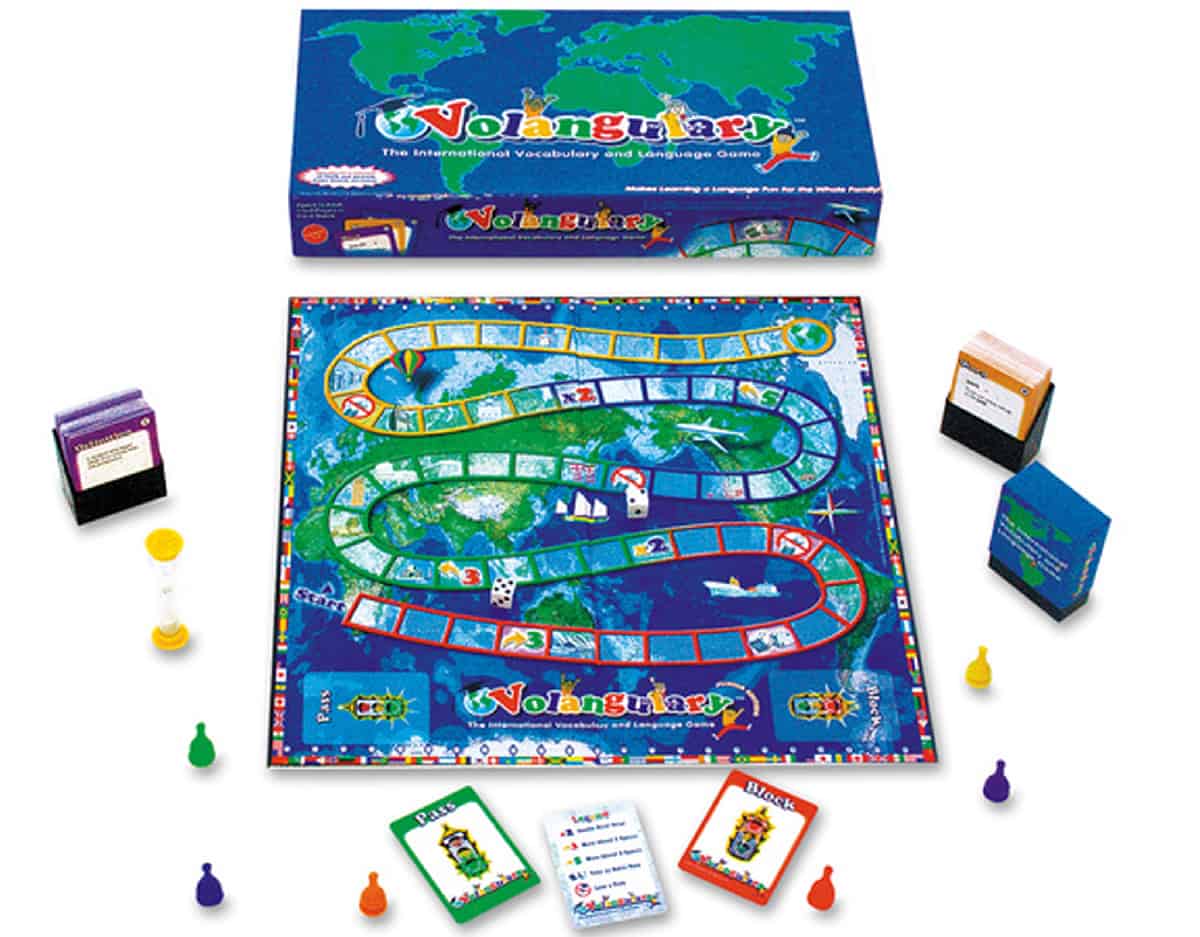
★★★★★
For Families and Teachers | Age 6-10 | 2-6 Players | 30 minutes
In Volangulary
Volangulary presents two levels of play: Junior and Advanced, each using a different side of the board:
- Junior: players use the side of the card with a sentence that uses the word. You can ask them to just read the sentence properly (used for reading practice), or to create a correct sentence using the word by themselves.
- Advanced: players use the side with the definition of the word. They read the definition and must guess the word.
What is great about Volangulary is that:
- It includes 570 cards (so it is truly replayable, and has a lot to offer as a learning material)
- You can really manage a progression
- The three card colors (purple, blue and yellow) correspond to levels of difficulty.
- The actual difficulty is given on the upper right-hand corner of the card as K, 1, 2 and 3
- You can have children of different ages play together while maintaining the interest of the game for all (just select the cards that are relevant for each age). This is a really rare feature that is very valuable at home.
- Enables to work reading words, definitions and building sentences
You can avoid using using pass/block cards, and giving penalties for incorrect answers, as these are more a nuisance than a feature in my opinion.
Multiple Meanings Around the World (Lakeshore Learning)
★★★☆☆
For Families and Teachers | Age 9-10 | 2-4 Players | 30 minutes
In Multiple Meanings Around the World
It includes a decoder (provides an answer key through a red filter), 45 question cards, and 20 challenge cards.
The main objective is to reach Australia and answer the question cards correctly.
A player who lands on a standard space has to answer a “question card”.
A player who lands on a country space can choose a “question card” or a “challenge card”:
- Question card– the game proceeds as normal
- Challenge card– if the answer is correct, the number obtained from rolling the dice becomes double which lets the player advance faster in the game. These questions are tough though, so children may either find this exciting or frustrating
Other special spaces are:
- “Jump to” – the player moves to the country that was named on the space.
- “Shortcut”/”Backtrack” – the player moves towards the end of the highlighted path (or the other way)
- “Move up or back X spaces” – the player moves the number of spaces indicated on the board
- “Lost Passport”- the player is stuck until he rolls a 2, 4 or 6.
- “Lost your Way”- the player loses a turn.
The strong points:
- Answers to MCQs can be checked through the decoder.
- The game board has colorful illustrations and easy to follow instructions.
- It can be played cooperatively.
I cannot give more than three stars though, because:
- There are not enough cards, making replayability a real concern
- There is no real progression in difficulty, only the “question cards” and “challenge cards” introduce a level of difficulty
Synonym & Antonym Gold Rush Vocabulary Game (Lakeshore Learning)
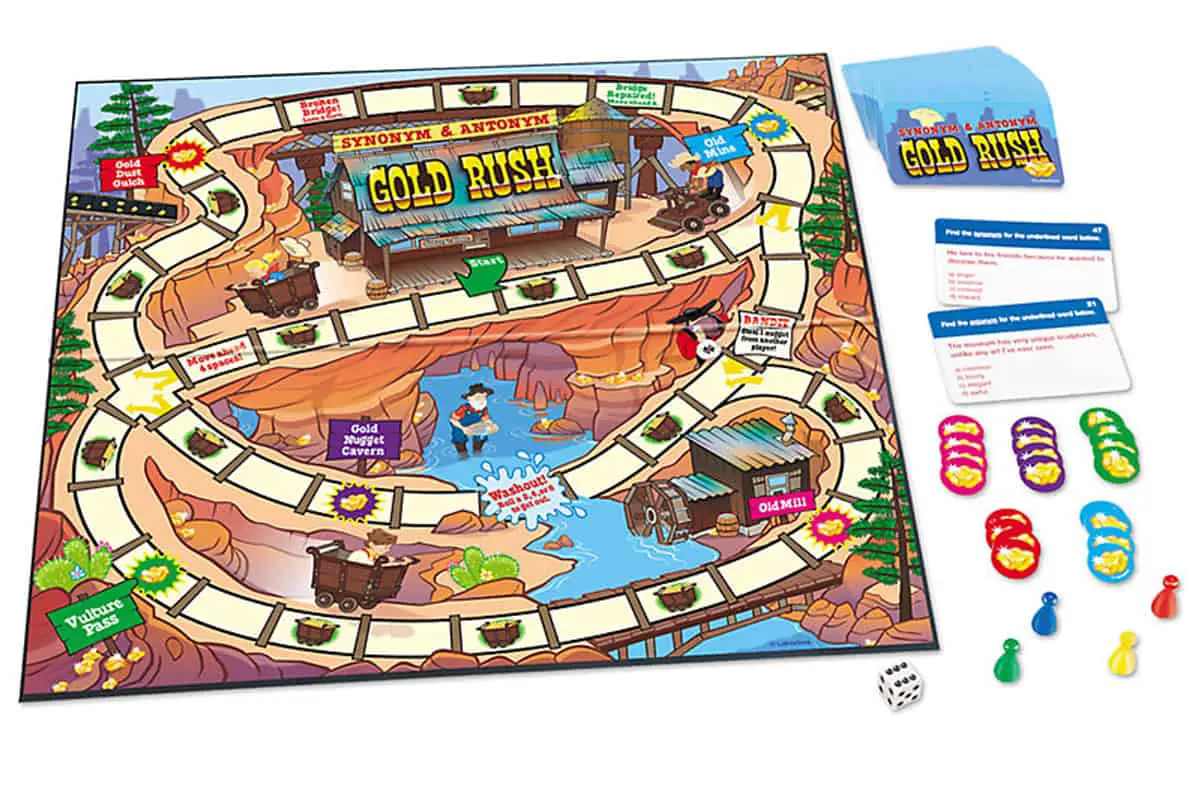
★★★☆☆
For Families and Teachers | Age 9-10 | 2-4 Players
In Synonym & Antonym Gold Rush
This game includes 50 question cards, 20 chips, and an answer card.
Each question card contains a sentence with an underlined word. Players must give the synonym or antonym of the given word.
Just like other race board games, there are special spaces with obstacles: Losing a turn, Getting stuck on the mine railway unless they roll a 2, 4, or 6, Having their golden nugget stolen by other players.
Some pros:
- There are no penalties for incorrect answers
- The answers are provided for immediate correction
But the problem is that there are only 50 question cards, which makes the replayability of the game low, and there is no progression (levels of difficulty of question cards are not included). This is why I only give 3 stars.
Vocabulary Family Engagement Pack (Lakeshore Learning)
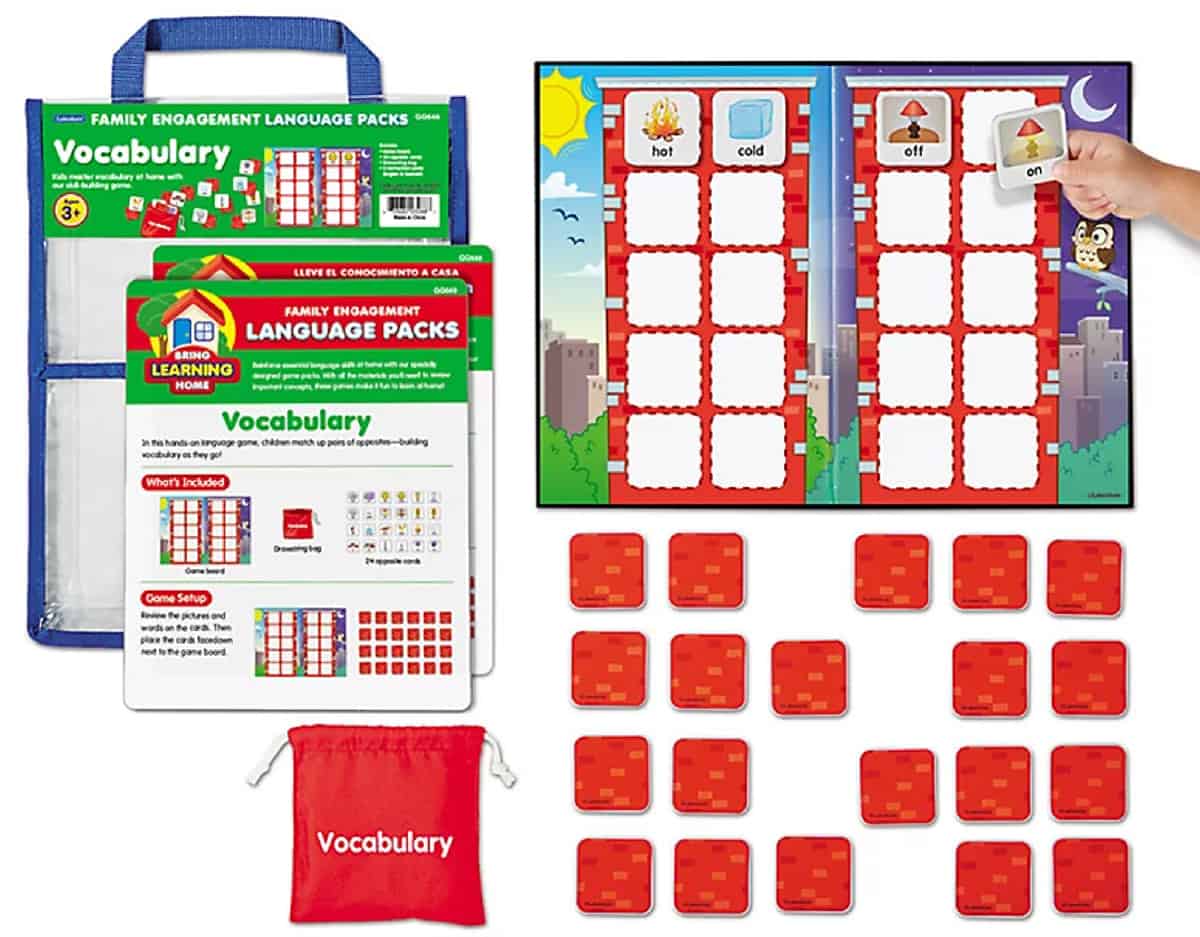
★★★☆☆
For Teachers to engage Families | Age: 3-5 | 1-2 Players | 30 minutes
Vocabulary Family Engagement Pack
Children should review the cards first before placing them face down on the gameboard. Players must get a pair of cards that have opposite meanings.
Card illustrations serve as clues for 3-5 year-olds.
The principle is good and simple, but there are really too few cards included there should be at least twice as many.
Go for the Dough (Super Duper Publications)
★★★★☆
For Teachers | Age 5-8 | 2-6 Players
In Go for the Dough
This game contains 480 “fake dollar” cards with one word on each, the question belonging to six different types (80 cards per type):
- Opposites: propose an opposite for the word
- Synonyms: propose a synonym for the word
- Multiple Meanings: explain two meanings of the word
- Definitions: give a definition to the word
- Rhyming words: find a word that rhymes
- Categories: propose a category the word belongs to
Players pick a card and answer the question. If they answer correctly, they can move their pawn on the gameboard, according to the number on their die.
Whether the player’s answer is correct or not, the fake dollar card goes to the center of the gameboard (where it will serve as the bank). A player who lands at grandma’s house collects all the cards in the bank.
The player with the highest number of fake dollars, in the end, wins the game.
The good points of this game are:
- 480 questions means the game is replayable
- 6 different notions (which you can filter according to your aim)
- Attractive theme
You can foster collaboration by encouraging students to help others when they have a difficulty in proposing an answer – but after giving enough time to the player at their turn of course.
I regret that there is no notion of progression though.
As there are no answers provided, I do not recommend it to parents, although the game can be played at home of course.
In this section, I included 4 vocabulary board games that are suited for classroom play due to elaborate categories and mechanics.
Quizmo Vocabulary (Learning Advantage)
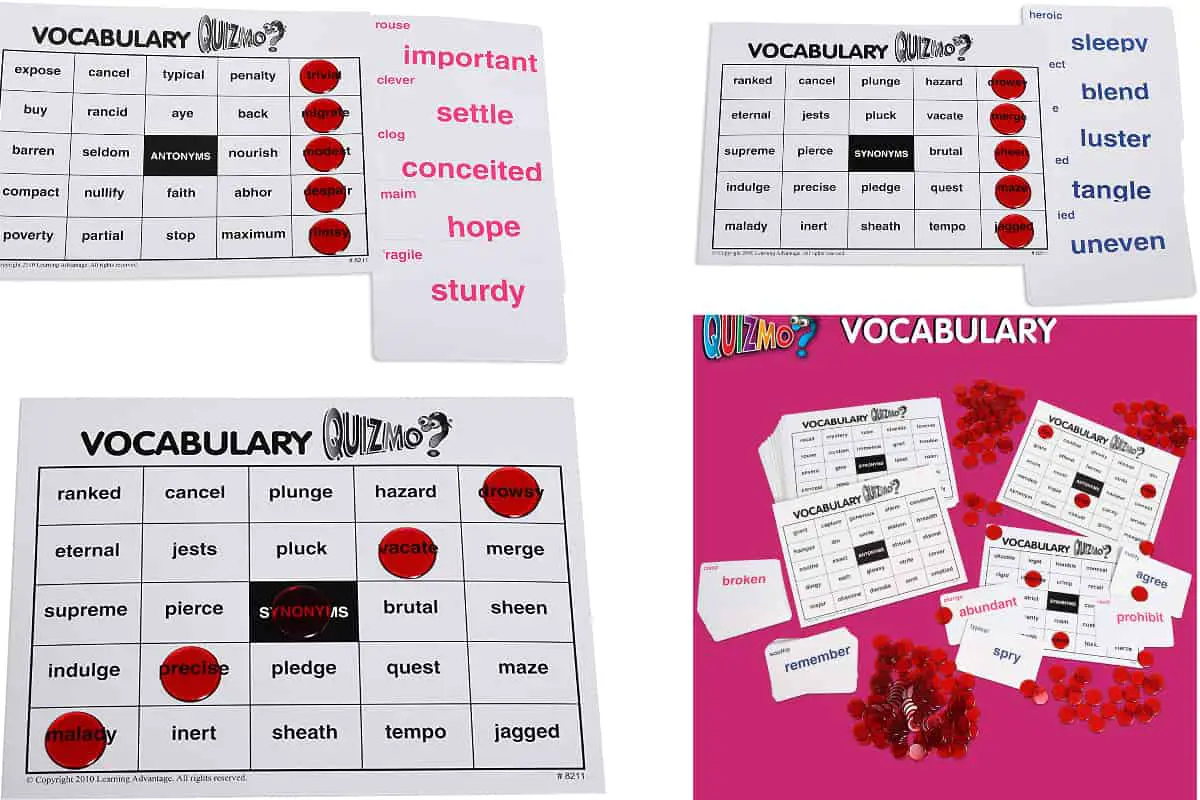
★★★☆☆
For Teachers | Age: 10-13 | 2-36 Players
Quizmo Vocabulary
It consists of
- 36 double-sided grid card
- 240 calling cards featuring 480 questions
- Plastic markers
There are two ways to use it:
- The calling cards can be used as flashcards. Each card is color-coded (synonyms in pink, antonyms in blue) and has the answer on its back
- The grid cards are played like Bingo. Each card has 24 words while the box in the middle indicates the category (synonyms or antonyms). Therefore you can play with a few players, but also with your entire classroom.
Although Quizmo encourages children to learn more words:
- Players may need to consult the dictionary to check the meaning of unfamiliar words (or get help from an adult) which will affect the speed of the game. Including word definitions on the cards would have really helped.
- The design of the calling cards is dull.
- There is no way to manage progression
Vocabulary Chipper Chat (Super Duper Publications)
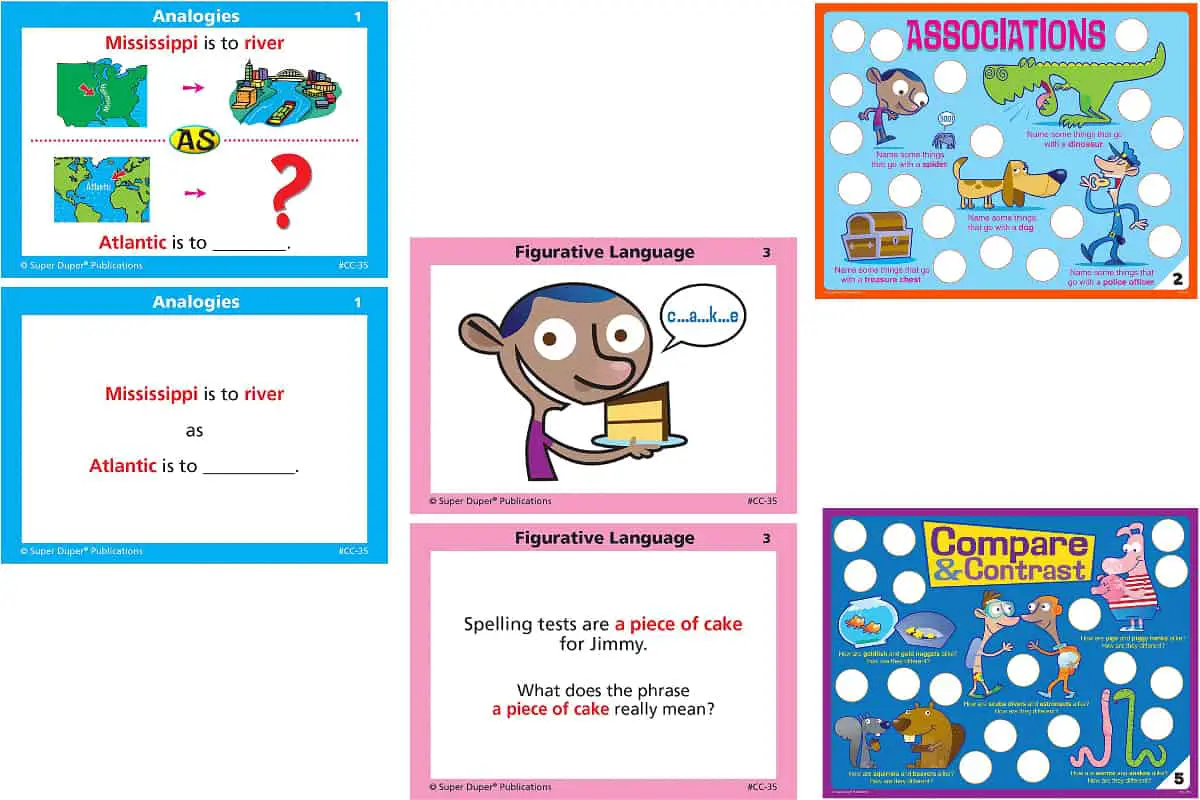
★★★☆☆
For Teachers | Age 6-10 | 2-5 Players | Grade 1-5
In Vocabulary Chipper Chat
- Analogies
- Associations
- Attributes
- Categories
- Compare and contrast
- Context clues
- Figurative language
- Functions
- Homonyms
- Homophones
- Synonyms & Antonyms
- Verbs
This game consists of:
- 60 grid gameboards (5 gameboards per theme)
- 360 vocabulary cards (30 color-coded prompt cards per theme), each with an illustration in front and an instruction at the back.
- Magnetic wand, 100 magnetic chips, a pair of dice
To play, draw a prompt card. Follow the instruction. If the answer is correct, roll the die to determine the number of magnetic chips the player should place on the circles of their gameboard.
Players continue until all the circles on their gameboard are filled with magnetic chips. Players use the magnetic wand to collect the chips at the end of each round.
The pros:
- suited for one-on-one session or small group activity
- teachers can assign appropriate categories according to their goal for the session
The cons:
- An adult must be there to correct the answers
- There is no progression within each theme
Vocabulary Board Games for Families
Blurt! (Educational Insights)
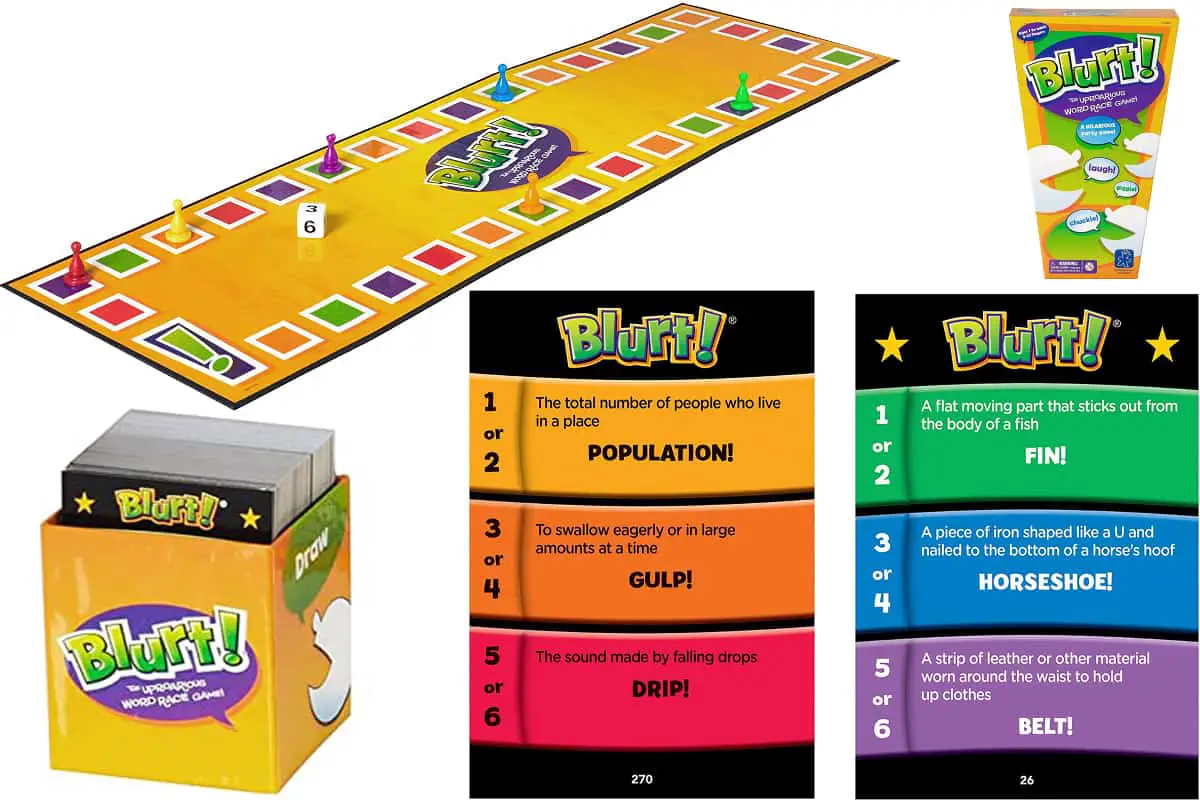
★★★★☆
For Families | Age 7+ with my proposed rule mods, 10+ else | 3-12 Players
Blurt!
The mechanics include rolling the die to determine the number of spaces the player will move on the board and the definition that will be read. The first player to circle around the game board wins the game.
Here are the pros and cons:
- There is no penalty for wrong answers, which is great. Children can try many times as they can until someone blurts the correct answer.
- The game is really replayable with its 1200 words
- But “Blurt!” is really competitive which will discourage slower players or younger players with less vocabulary (unfortunately it is the ones who need to progress the most).
- And there is no notion of progression (the words are not organized by levels of difficulty, which is a pity)
Because of this Blurt! cannot be recommended for use in the classroom.
You can of course change the rule to allow younger players or slower players to participate:
– Make the game cooperative: The aim of the game is for everybody to close the full circle. Players are allowed to give other players clues when they do not find the word, such as the first letter of the word, or the first syllable or the word
– Let younger players time to search before older or more advanced players are allowed to give answers (just use a timer for example)
Blurt! helps:
- Practice word rapid recall
- Learn new words or better understand the meaning of words they already know
Hot Words (Spin Master)
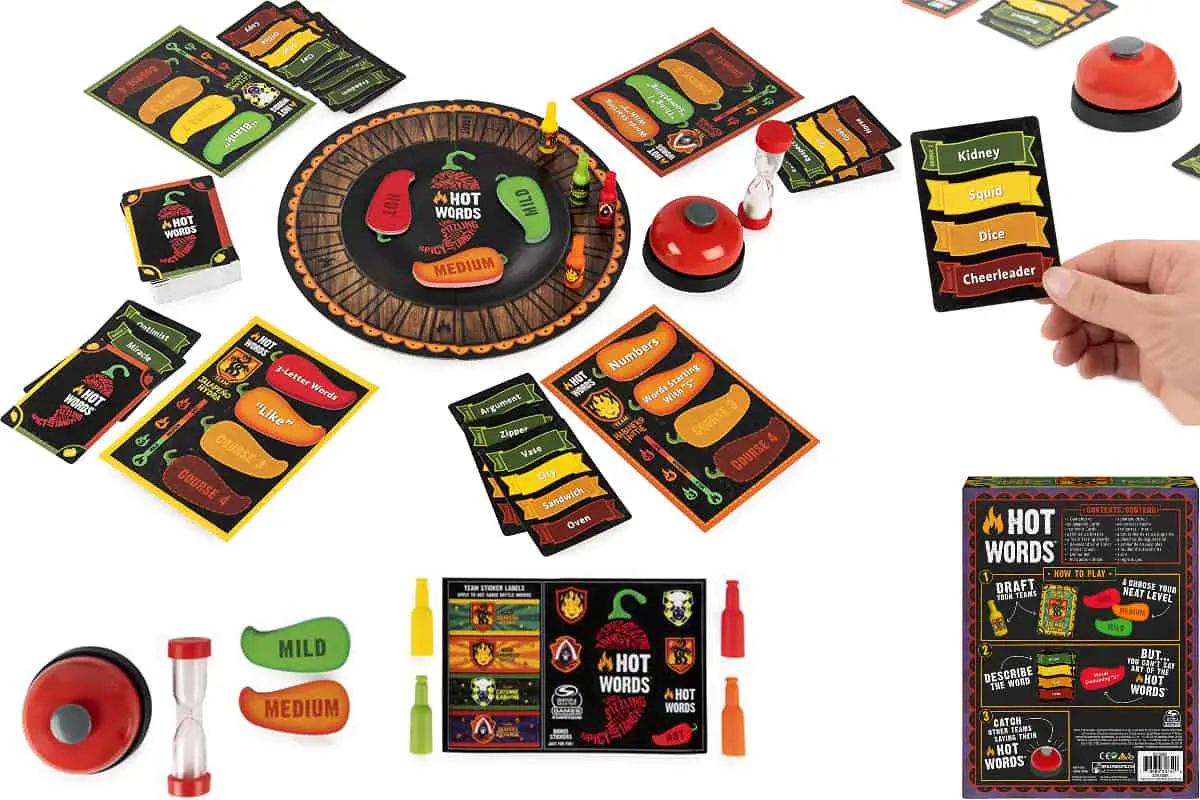
★★★☆☆
For Families | Age 12+ | 4-20 Players
Hot Words
Players on the same team help each other guess the word they draw by describing it. But they cannot use the “hot words types” described on the “Jalapeno cards” that they have drawn since the beginning of the game (for example a spicy red card is “three-letter words” meaning that you can no longer use three-letter words to describe the word you want the others to guess.
It is restaurant-themed, with several “restaurant artifacts”:
- 4 “team tasting” boards
- 50 “Jalapeno cards”
- 150 word cards
- 4 hot sauce bottles (Playing tokens)
- A dinner bell & a sand timer
This game is great because of its well-designed theme, and its increasing difficulty during the game. Players have to be creative and find alternative ways to describe words (without miming for example).
The players (12+) will not learn new words of course, but they will try to describe and define them under constraints, which is a great exercise.
Word on the Street (Out of the Box)
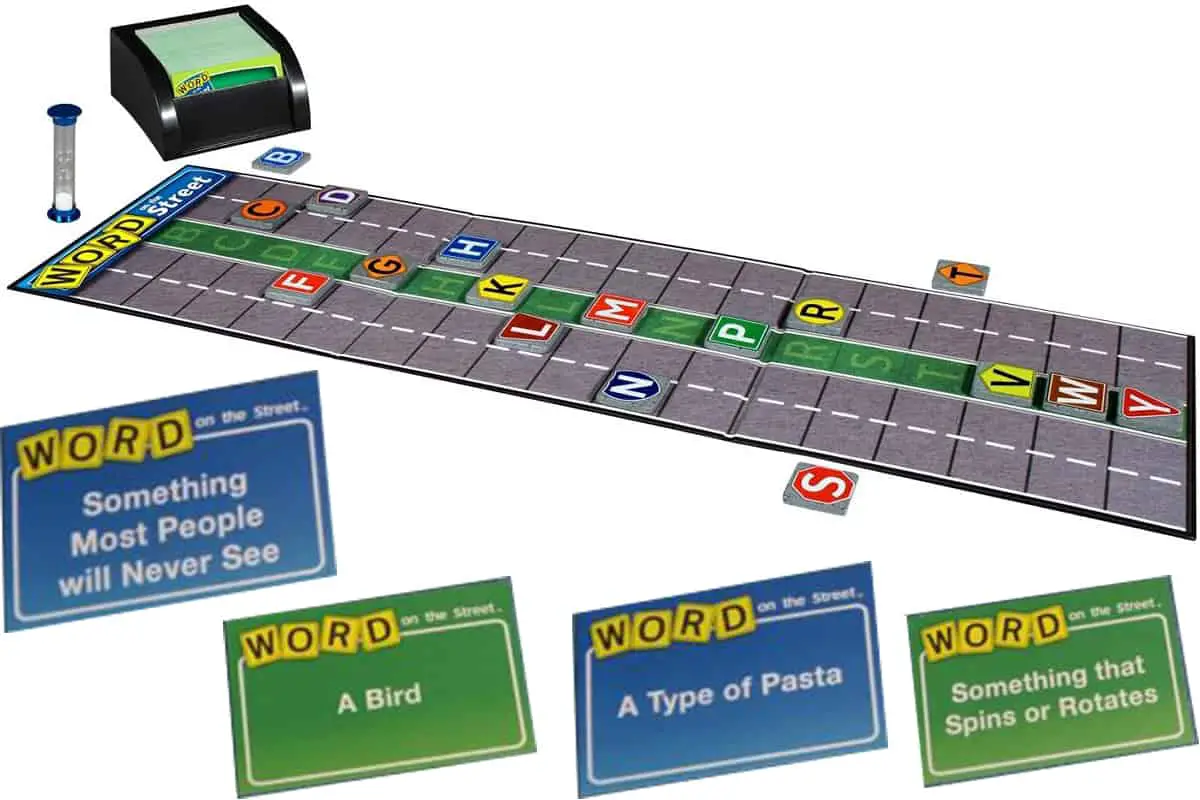
★★★☆☆
For Families | Age 12+ | 2-8 Players | 30 minutes
Word on the Street is played by two opposing teams composed of 1 to 4 players with:
- 17 letter tiles: there are no vowels and some consonants are missing like z,j and q
- 108 category cards: double-sided (hence 216 categories) and color-coded according to the level of difficulty (green for easy and blue for difficult)
The main goal is to capture eight letter tiles on the team’s side of the street and get them off the board. It is difficult because:
- Players must come up with the best word according to the available letters set on the gameboard
- The word must fit the category
- The word must be spelled aloud correctly as they move the letters to their side (one lane at a time)
- Opponents can sidetrack each other and recapture letters by using it in their turn (you cannot recapture the letters that are already off the gameboard)
The letters go back and forth on the gameboard in a tug of war fashion as teams take turns proposing words.
“Word on the Street” is effective for educational purposes because it enables to focus attention by selecting specific categories.
What is a little frustrating though:
- It is hard to spell a word that has with missing letters (confusing for beginners)
- A referee is needed to monitor scores and turns because teams may reject a word if it doesn’t fit the category.
Since the mechanics are a bit complex, I suggest children aged 8-12 years old to pair up with adults at first until they get used to the game.
Word on the Street Junior (Educational Insights)
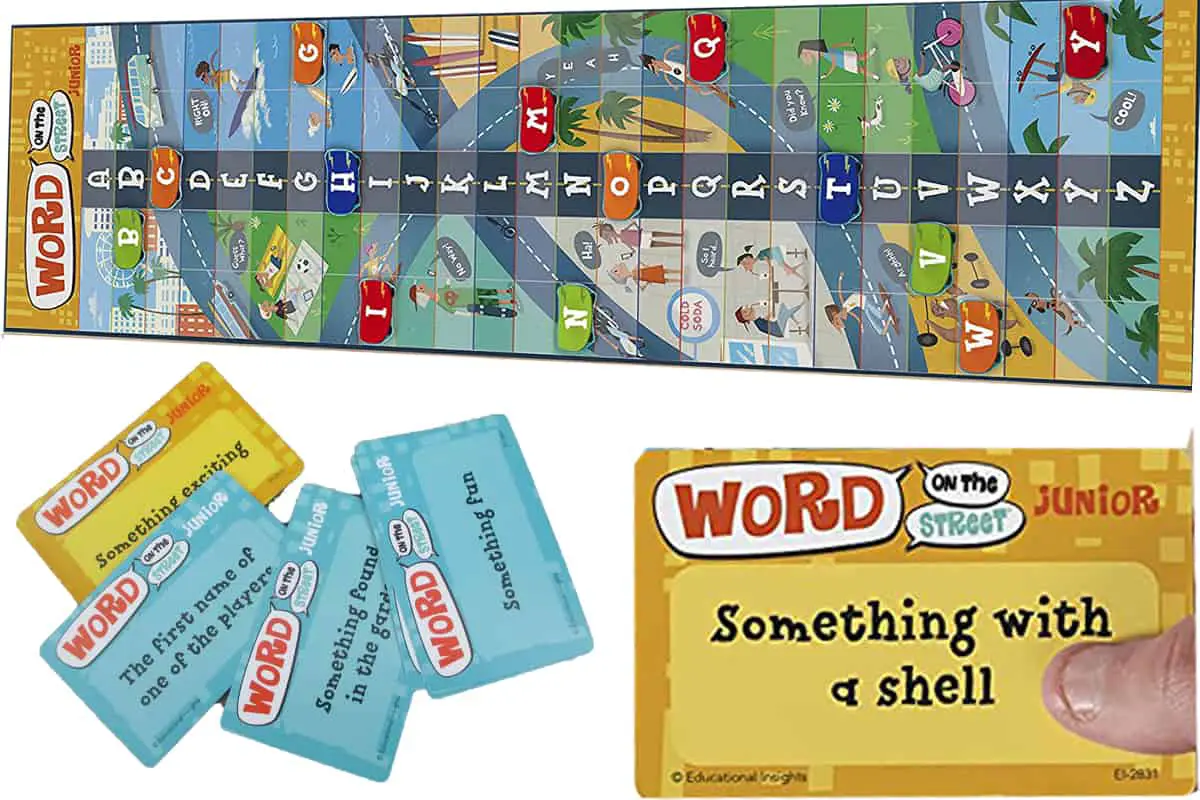
★★★☆☆
For Families | Age 8+ | 2-4 Players | 30 minutes
The rules of Word on the Street Junior
Lexogon (Tippecanoe Games)
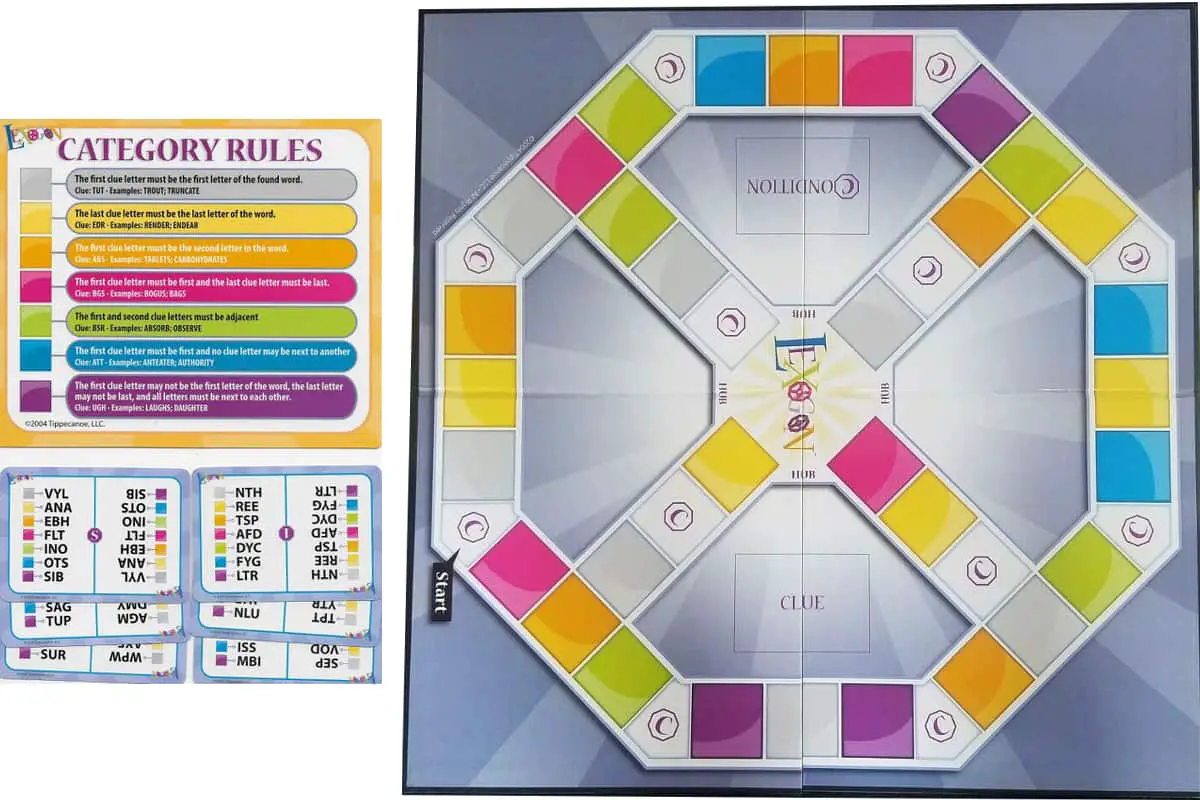
★★★☆☆
For Families | Age 12+ | 2-6 Players | 45 minutes
In Lexogon
This game contains
- 230 clue cards (115 standard which are for children & 115 intermediate recommended for adults), having each 7 color-coded three-letter clues.
- 67 condition Cards
- Two sand timers & Score Pads
Players :
- Roll the die and move their token by the number of spaces indicated by the die.
- If on a condition square on the board, draw a condition card and apply the rules given by this card
- Else, use the clue on your clue card that matches the color on your square, and the “category rule” for this color
- Find words that fits the targeted clue and rule (within 90 seconds).
Here are the pros and cons
- Younger players can use the “standard clue cards” while adults use the “intermediate clue cards”, making it possible for younger players to beat adults
- The condition cards create randomness in the game, making it possible for weaker players to win
- The 7 types of clues (and corresponding category rules) are confusing though. You might want to simplify them at first.
How Effective are Games in Vocabulary Acquisition?
Games offer repetition which is one of the most effective ways to learn new words.
Students need to be exposed to a new word five to sixteen times to acquire it. Playing vocabulary board games can increase that chance for a new word to make it into long-term memory.
Games maintain students’ motivation in vocabulary learning.
Students remember things faster and better when they are relaxed, interested, and entertained. All these factors can be found in playing vocabulary board games.
Edudingo.com is a participant in the Amazon Services LLC Associates Program, an affiliate advertising program designed to provide a means for sites to earn advertising fees by advertising and linking to Amazon.com. We also participate in other affiliate programs which compensate us for referring traffic.
Children grow their word bank by pronouncing and spelling new words every single day. But what if you can make the learning process fun, engaging, and 10 times better than the normal routine. Plus, it is fun to make learning words a hobby for your children. How?!
The answer is Word games. Word games provide a unique and fun way to help kids improve and expand their minds by playing with new words every single day. They get more comfortable pronouncing words and they become more confident in themselves.
If you are a parent looking for such educational and fun word board games, then you are at the right place. Here we have compiled a list of the 8 Best word board games to save you the hassle of time and improve the life of your child.
Benefits of word board games for kids
Numerous studies have been conducted on the health benefits of word games for kids and teens of all ages. Here is a list of some of the benefits your child will gain from playing word games.
- They increase your kid’s language skills
- Better memory and mental cognition
- Better focus and concentration
- Increase in confidence
- Helps in socializing with others
Bananagrams
Best for: Ages 4+
Number of players: 1-8
This is one of the most perfect word board games to make your kids smarter. They learn new words using leather tiles. Kids grow their vocabulary much faster than most word games. The speed required to pick up the pace will improve your child’s coordination and focus. Bananagrams provide simple letter tiles that make it easier for the children.
It is like a crossword puzzle. Words are arranged to intersect horizontally and vertically but not diagonally. Words are sorted in groups making it easy to learn more words quickly and easily.
Click to learn how to play Bananagrams board game.
Benefits of Bananagrams for kids
Bananagrams will help your children achieve the following.
- Get better at recognizing letters and words
- Language development
- Get better at categorizing words and ideas
- Boost in confidence levels
Scrabble
Best for: Ages 7+
If you are looking for a word board game that will encourage your child to learn more words and also remember them, Scrabble is the game for you.
With scrabble, children learn to unscramble words, learn prefixes of words, and therefore add more words to their word bank.
Use the scrabble dictionary to help your kids learn more words, get better at scrabble, and improve their literacy skills.
Benefits of Scrabble for kids
Here is a list of advantages your child will gain from playing scrabble consistently.
- Increase in cognition
- Sharp thinking skills
- Improvement in spelling and pronouncing skills
- Build a broader vocabulary
- Help them communicate more effectively
Word on the street
Best for: Ages 12+
Number of Players: 2-6
Word on the street board games is very simple and fun to play with others. Your kids will get to compete with their peers and learn to come up with words, focusing on specific words gives your child incredible mental insights and revelations.
Your kid’s vocabulary will improve greatly and at a faster pace because of the time component to come up with words given to them by the opposing team. Also, your kids will learn words by category. By category, I mean words belonging to a specific class. For example, if you are given a category card that says “a form of entertainment”, you are required to come up with a word that fits that particular idea.
Benefits of Word on the Street for kids
List of benefits children will gain from playing Word on the street.
- Improvement in vocabulary skills
- Better social skills
- Bigger and broader vocabulary
Letter Jam
Best for: Ages 10+
Number of Players: 2-6
This beautiful game is in my opinion is a combination of boggle, scrabble, and a little bit of deductive reasoning which is very important for children to develop. It forces you to come up with words using single letters of other players.
Letter Jam is a cooperative game, a game played among friends and family, assisting each other to figure out words, and improving each other in the process. Your kids will love it, with their word bank expanding, and their grades improving in the process.
Boggle
Best for: Ages 8+
Number of players:1-8
Boggle belongs to the same domain as scrabble, but without using a gameboard. Using randomly flipped lettered dies, you connect letters to form words. It basically challenges kids to learn more three to five-letter words. It also helps kids to spot unique words from a pile of jammed-up letters AKA Pattern recognition.
Click to learn how to play Boggle board game.
Benefits of Boggle board game for kids
Boggle is an essential game for children because of these reasons
- Children learn new words and are able to pronounce them easily.
- Just like scrabble, it improves their overall cognitive function.
Taboo
Best for Ages4+
Number of Players: 4-6
This is a competitive game with the objective of scoring more points than the other players. In the game, you, the clue giver, describe a word or phrase without using a set of words known as Taboo.
The more your kid’s play, the more words they learn and the more focus and concentration they develop as a result.
Benefits of Taboo board game for kids
Taboo is good for kids for the following reasons
- It helps children come up with better ways of learning.
- It helps children to think more broadly and logically.
- Better and quick cognitive skills.
Click to learn how to play the Taboo board game.
Tapple
Best for: Age 8+
Number of players: 2-10
Tapple is not only educational for kids but fun and exciting. A great game to play with family and friends and provide a healthy environment for your kids to thrive intellectually. It is simple to learn and works with categories, categories based on level of difficulty, easy category—white and blue, difficult category— yellow and red. So, you can switch to any category based on the kid’s ability and grow from there.
This game is extremely beneficial for kids’ mental development. Giving them categories to think of words that might belong to that category will increase their mind exponentially. It will teach them to think more carefully about words. They will also learn to spell words better and quicker.
Codenames
Best for: Ages 14+
Number of Players: 2-8
Codenames is a little bit more advanced than most word games. It requires careful thinking and strategy. For kids, it provides an opportunity to boost their current mental strength and learn advanced thinking skills. To keep the kids glued to this game, it is advisable to play it with them.
Codenames is a clue-based game and will help kids learn how to associate words with certain names, learn through guessing, figuring out their mistakes, and improve through every gameplay. It can also be played cooperatively.
This game is fun and engaging! It is not about winning or losing but developing the skill of figuring things out using words.
Click to learn how to play Codenames board game.
Over To You
Word games are very powerful tools to help your child grow their vocabulary and other mental skills. To ensure your child gets the maximum benefit from the process, make it fun and also participate in the games.
Other Best Word-based board games you might be interested in?
- Decrypto
- Werewords
- Paperback
- Just One
- Wordigo
- 21 Letters
- 25 Words or Less
- Take a letter
- Dabble
- Typo
- Pass the Pen
- Quiddler
- Qwirkle
- Big Boggle
- Crazy Letters
- Pairs in pears
- Upwords
- Wordical
- WordSpiel Card Game
- Hasbro Scrabble
- Scattergories
- A little wordy
Board games are a great way for students to explore new vocab words, put to use vocabulary they already know, and practice spelling and pronouncing those words. (By the way ‘board games’ means that objects are included in the gameplay; not all of these have actual boards.) To play these games, students may need to be able to describe, explain, categorize, or give examples of words.
Keep in mind that the core concepts here are the gameplay, not the products. Once you know the purpose and mechanics of a game, you may be able to create your own version of the game, which will allow you to customize the words involved and the difficulty level. If you do choose to purchase a game, know that some of them have multiple editions, so look for the one that best matches the tone, interest, age range, and difficulty level relevant to your class. Finally, feel free to work in pairs or groups instead of as individuals.
Here are several games I recommend.
Scattergories
In every round in Scattergories, players are presented with a letter and several categories. Each player must write down a word for each category that starts with that letter (for example, if the letter is ‘P’ and the categories are ‘fruit’, ‘clothes’, and ‘animals’, a student might write down ‘plum’, ‘pants’, and ‘panther’). When I do my own version, I typically reverse the prompts in a round: I give one category with several letters. It’s easy to include topics you’ve covered with your class previously. If you’d like to make it more challenging, then students only get points if no other student/team gave the same answer.
Apples-to-Apples
Apples to Apples is about matching nouns to adjectives. In the classic gameplay, students have noun cards in their hand and must submit one that best matches the given adjective card for that round. The judge decides which answer is the best. Start with some straightforward examples, but the game often turns silly as players suggest ridiculous pairings, which may end up winning the round depending on the judge.
We have a full post on how to create customized Apples-to-Apples for your classroom, so be sure to read that.
Codenames
In Codenames, an array of cards are laid out, each with one word on it. About a third of the cards are designated for your team, and the other team has the same. On each team, one player gives clues as to which cards/words are theirs, and the other members of the team have to select the correct words. In this game, teams can do multiple words in a round. For example, if three of my team’s remaining words are ‘package’ ‘boat’, and ‘UFO’, I can give the clue ‘ship’ for all three. Be careful not to select the other team’s cards, and especially not to select the one card that causes you to lose the game immediately. The first team to collect all their cards wins!
Scrabble / Bananagrams
Scrabble seems to be an old favorite. What words can you create given seven letters or less plus at least one more letter that’s already on the board? This can be tricky to do well, so I don’t recommend it for beginners. The best scrabble players use short words because where you place your tiles often gives you more points than the number of tiles you place. Therefore, if you’re going to do this with your students, it’s great to review short, common words like auxiliary verbs, prepositions, conjunctions, and pronouns first. That said, you should play with them and make some longer words (not necessarily trying to get lots of points) to increase the play area and grant the others more opportunities for word placement.
Bananagrams is essentially the same as scrabble except that there are no boundaries (it’s not on a board) and players don’t take turns (so speed is crucial).
Boggle
Boggle is like the reverse of Scrabble. It also includes individual letters forming words, but this time players have to identify words already in place instead of creating them. It’s like a randomized word-search. Much like with Scrabble, many of the words in Boggle will be little words lie prepositions, pronouns, conjunctions, and auxiliaries, though certainly not all of them. To get the most out of Boggle, have your students focus on common letter combinations like ‘st’, ‘er’, ‘on’, and so forth.
Dixit
Half of Dixit is about identifying the correct picture based on a verbal clue. The other half of Dixit is selecting an alternate picture that might fit the clue. The picture you select will be used to mislead other players as you try to determine the original picture that inspired the clue. The player giving the clue shouldn’t make it too difficult (because it’s not good if no one guesses correctly) or too easy (because it’s not good if everyone guesses correctly, either). This is a great game for creative minds but can be trickier for younger children because both the pictures and the clues are rather abstract. For that same reason, the possibilities are endless.
Guessing Games
With guessing games, one player typically gives clues about a word or phrase, and their teammates have to guess the correct word/phrase before time runs out. I’ve put them into groups based on the way the clues are presented. If you choose, you can have an unbiased player present the clues and let both teams (or all the teams) guess at the same time instead of taking turns.
Taboo / Password / Catch Phrase! / Hedbandz
These three games are about explaining a word or phrase using other words. Catch Phrase! is probably the most straightforward. With Taboo, you’re given a list of related words you’re not allowed to use. With Password, you can only use one single word as a clue, and if your team doesn’t guess correctly, the other team gets a shot. Hedbandz isn’t about teams, but instead everyone is helping each other all at the same time, and each person has their own word to guess.
Pictionary
In Pictionary, the clues must be drawn; the player giving the clues cannot speak or write.
Guesstures / Charades
Everyone knows Charades. One player gives clues by acting them out. Again, they cannot speak. Guesstures is essentially the same but faster and the classic symbols of Charades are less important.
Cranium / Activity
With both Cranium and Activity, player tokens progress along a board, and the space they land on in a given round determines whether the clue needs to be spoken, drawn, acted out, or other.
These word board games are an excellent way to build up your middle schooler’s vocabulary. They’re educational board games for teenagers.
As teens get ready for high school, it’s important that they have strong language skills, both reading and writing. That means during the middle school years, they should spend time improving their spelling and vocabulary skills.
Instead of relying on a large curriculum or boring worksheets to help your teens further develop their word building skills, play some of these board games instead. They’re a great way to work on language arts.
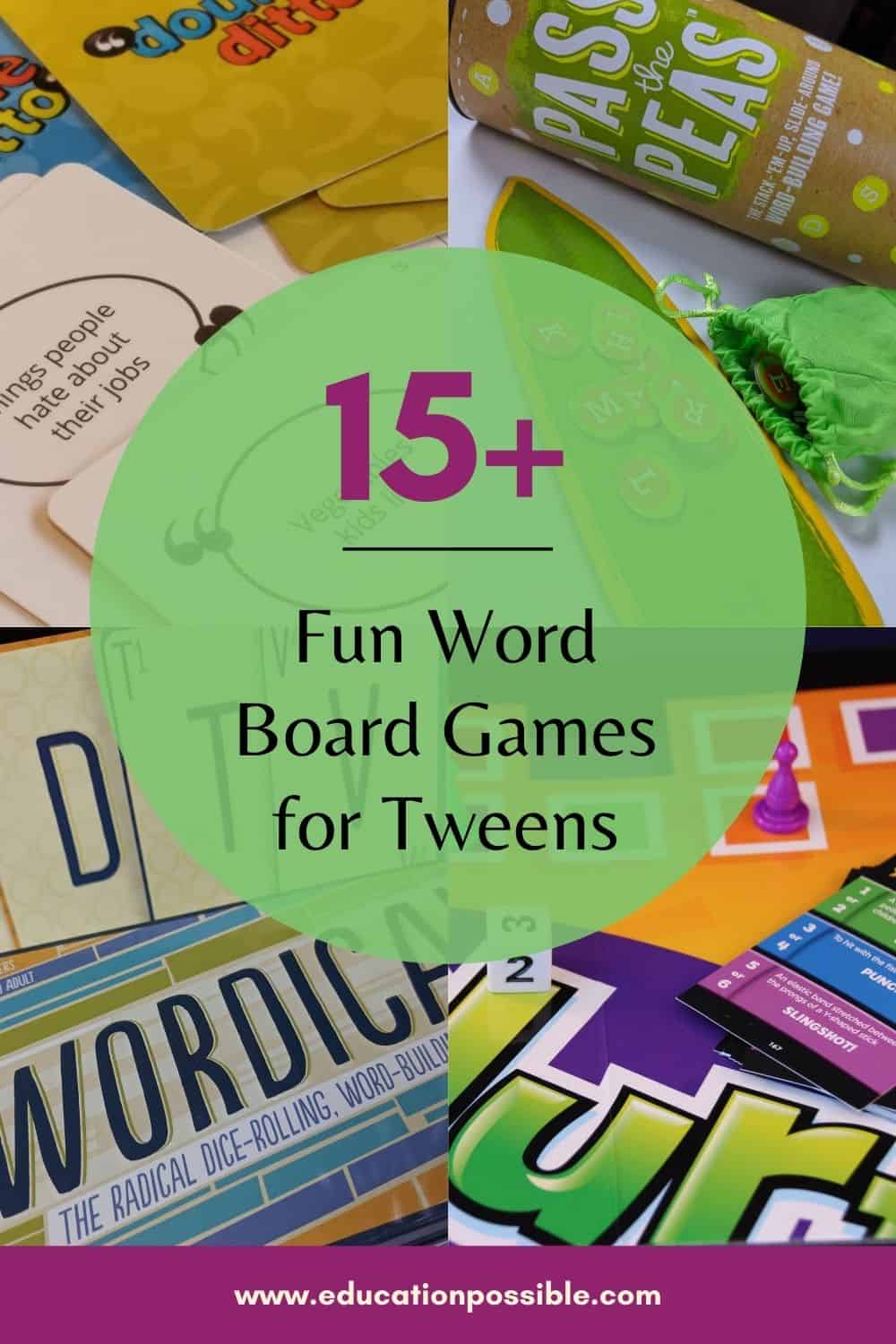
When middle schoolers play these vocabulary word games, they’re not just sitting there answering questions and spouting memorized facts. They’re playing with words and being creative.
Fun language arts games help teens get comfortable with spelling, vocabulary, and building words. All of which improve their reading and writing skills.
Personally, I think the days of giving kids long lists of words to memorize for spelling and vocabulary are long gone.
Tweens learn better when they’re immersed in a subject instead of just retaining facts.
One way to engage your homeschooler in language is to play games specifically designed for word building. As they play, they’ll be shoring up their spelling skills, building their vocabulary and improving their reading skills, all while having some fun.
Board games also have an element of friendly competition built in, so your older kids will be busy trying to beat you and each other, and they’ll probably forget they’re actually learning.
Not only are these word games perfect for language arts class, they’re so enjoyable that they make great additions to your family game night.
The ultimate goal is to raise kids who can communicate effectively, whether written or verbally, so I’m all for using whatever tools work to accomplish this.
These board games and card games are fun to play and excellent tools to add to your language arts plans.
How to Use Board Games in the Classroom
So how can you incorporate board games like these into your classroom or homeschool? It’s actually easier than you think!
- Set aside your language arts curriculum for the day (especially any spelling or vocabulary plans) and play a game instead.
- Transform a standard game by using the facts you’re teaching as the clues.
- Play a word game during lunch. It’s simple to pull out one of these games while you’re sitting at the table eating, and it won’t take any time away from your school day.
- When kids finish their work early or after you give a test, use a word game as a reward.
- If you usually take a day off during the week or have one where your teen has a lighter course load, take an hour to play a game or two.
- Add these word board games to your next family game night. Everyone can benefit from expanding and strengthening their vocabulary. Plus, tweens will love trying to beat you in a word game.
Use games with small groups, individual play, or as a fun activity for the family.
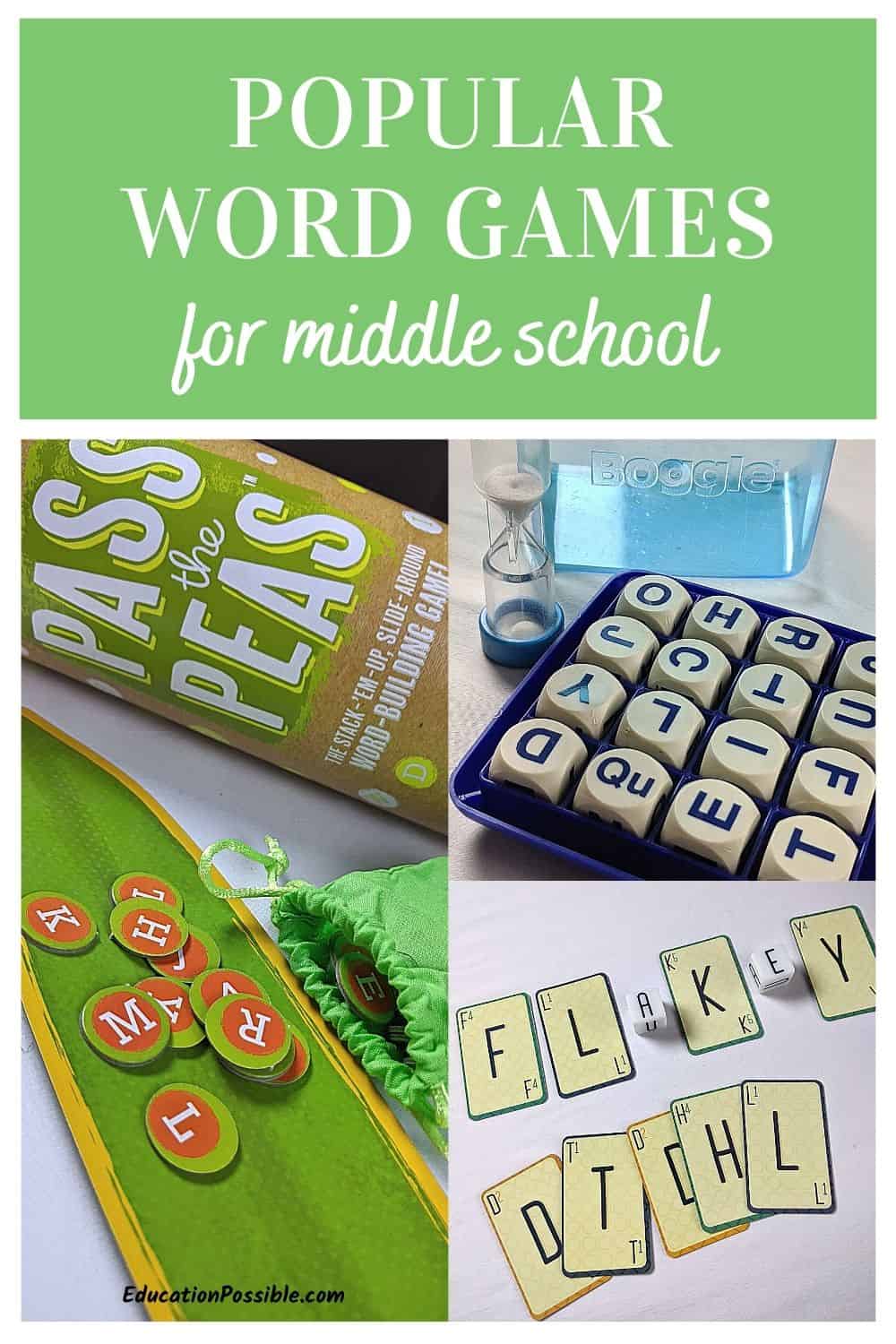
Any links in this post may be affiliate links. See my disclosure statement.
MORE LANGUAGE ARTS ACTIVITIES
Aside from word games, there are plenty of fun activities you can use to build the vocabulary of older children.
- Improve creative writing skills with Story Builders.
- Printable word games.
- Teach writing to teens with dysgraphia.
- These word tools will build confidence.
This is one of our favorite word games. Players race to write down two words that fit the category on the card, and if they match another player’s answer, they both earn points.
It’s an awesome family game.
You play this game with two stacks of cards — category cards and letter cards.
The top card on the category pile is turned over first. As soon as a letter card is flipped, players rush to be the first person to shout out something that fits the category and starts with the letter.
Players race to be the first one to find the word that hides in the letter spiral.
Sounds easy, but it can be quite challenging to find where the word begins and ends when you’re scrambling to beat your opponent.
Scattergories is a classic game that helps build vocabulary words.
Players start the round with a category list. Once the letter die is tossed, they must rush to write as many words as they can that fit the category and start with the chosen letter.
You need to be quick to finish before the time limit. But only unique answers count, so you’ll have to use your vocabulary to win.
As players move around the board, they try to guess the correct vocabulary word from the definition card.
If they give the wrong word, the other players have time to answer.
This game puts a unique twist on the classic crossword puzzle game.
Players try to score the most points by creating words, but they have the added choice of adding their letters on top of other ones.
The higher the pile, the more points players earn.
This game is played with 8 stacks of cards in the middle. When it’s your turn, you choose any of the top cards and create a word. The next player does the same, but then can use the remaining letters to play on your word.
Play continues until you use all the cards.
This is another game that’s played with category cards and letter cards.
However, with this game, when the cards are turned over, players try to be the last one to shout out a word that starts with the letter and matches the category.
The timer is random, so you never know when the time will end.
Players spin the spinner to determine the two letters and category for each round. Then, players race to write as many words as possible that start with one letter and contain the other and also fit the category.
Scrabble is a classic word game that’s still an excellent tool for building everyone’s spelling and vocabulary skills.
Players use their chosen tiles to make words, while trying to get the highest score possible.
This is a fun game to play and is incredibly portable, thanks to the handy banana pouch.
There are lots of variations on the gameplay of Bananagrams, so you’ll never get bored playing. In the classic play, players use their tiles to make words in a crossword-style form.
Boggle is a fun sight word game that’s been around for years.
Players put the lid on and shake the letter dice. Once they settle, start the timer and try to find as many simple words in the letters as you can.
Write them down on a piece of paper before time runs out.
Players are given 20 tiles, and a 5 tiered holder to begin.
When someone says go, everyone races to build 5 different words with their tiles and place them in the slots on the plastic holder.
As soon as someone builds their words, they shout, Dabble, and the round ends.
This vocabulary game includes 108 consonant cards and 2 vowel dice.
Players roll the vowel dice and use them with the consonant cards in their hand to build the highest scoring word.
This is a cute game that will definitely challenge tweens.
You give all players a paper pod and colored letters. When the timer begins, they use their letters to build a word on the pod. Then, they give the pod to the next player and the next round begins.
Now players use the word in front of them and their remaining letters to build a new word.
When your pod gets back around to you, you count the number of letters in your color and that’s your score for the round.
This game will definitely get your tween’s creative juices flowing.
There are 9 dice with pictures on each side. To begin, a player rolls the dice and tells a story, trying to include as many of the pictures as possible.
This is a great game to take along to parties or on a family trip.
There are a bunch of other dice/picture variations you can choose from too.
Here’s how we use Story Cubes in our homeschool.
Hopefully, you’ve seen how easy it is to help your teens build their language arts skills through games. Plus, they’re a lot of fun for middle school students!
Remember that your vocabulary is like a muscle. The more you use it and work it, the stronger it gets. And word board games are a good way to get older kids excited about English language arts.
Don’t let tweens just sit there answering questions and spouting memorized facts. Take some time to play these word games in your homeschool and watch how quickly everyone’s language improves.
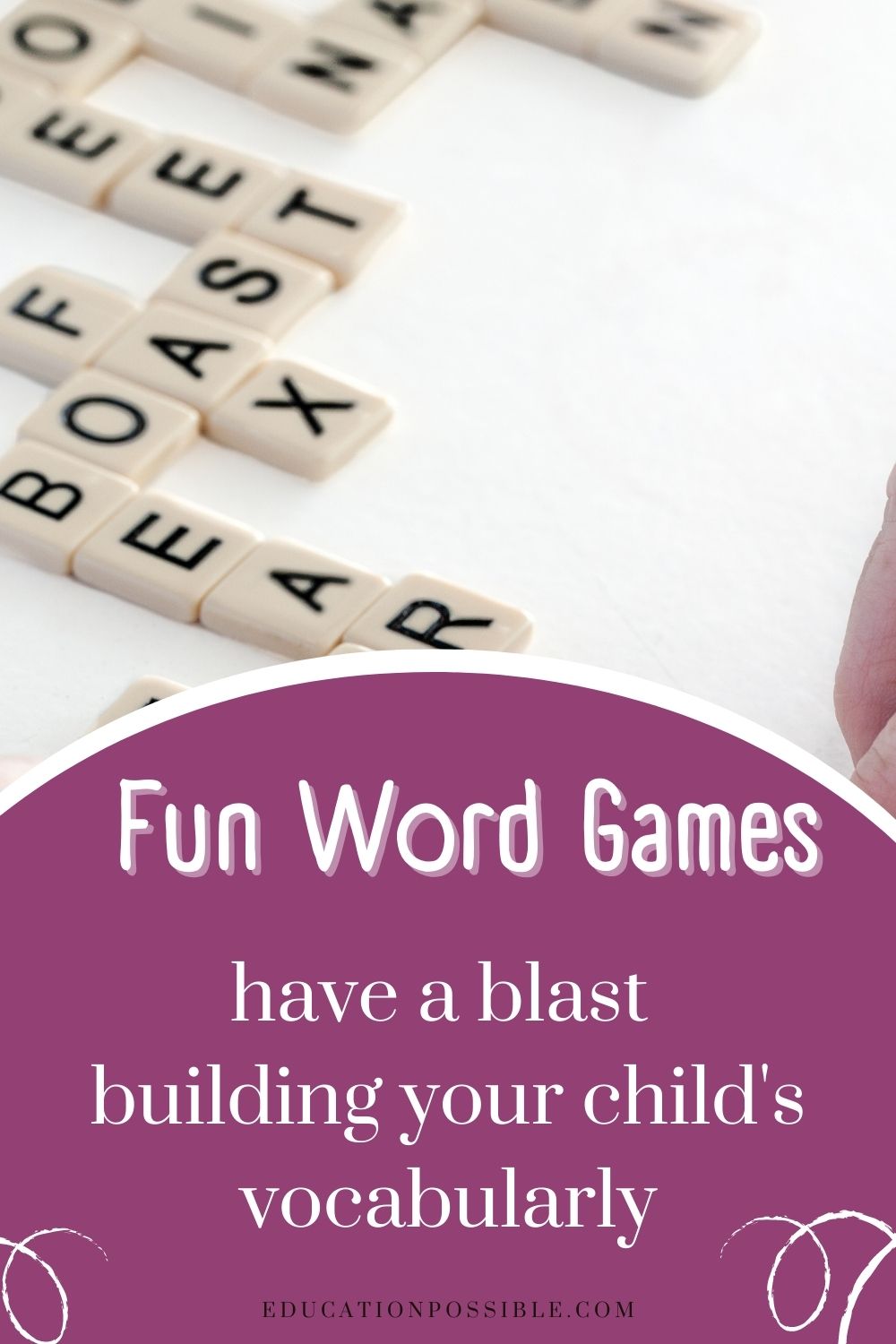
WHAT’S YOUR FAVORITE WORD Board GAME?
- Bio
- Latest Posts
I love homeschooling! Learning is a way of life for our family. Most days you will find us exploring our Central Florida community, having fun while learning. I am constantly looking for new and interactive ways to engage my older children.
You found our list of fun and simple vocabulary games for adults.
Vocabulary games are activities that include language and wordplay. Example games include Word Association and Hang Man. Players can enjoy vocabulary games in person or online. The purpose of these games is to strengthen vocabulary skills. These games are also known as “vocab games”, “letter games” and “vocabulary building games.”
These games make great online classroom activities and communication games, and can be used as online fun activities for employees.
This list includes:
- vocabulary games for adults
- simple vocabulary word games for adults
- fun online vocabulary games and activities
- English vocabulary games
- vocabulary games in English
- games to improve vocabulary
- vocabulary building activities
- vocab review games
- vocabulary games for students
Get ready to play!
List of vocabulary games
From Pictionary to word scrambles to synonym memory, here is a list of fun word games to play in classrooms, at parties, or during meetings.
1. Vocabulary Pictionary
Pictionary is a game of charades where players draw words instead of acting them out.
To play:
- Split the group into teams.
- Each round, assign one team member to draw.
- Give the drawing team member a word.
- Allow up to sixty seconds for teammates to guess.
- If the team guesses correctly, then assign one point.
You can give other teams the opportunity to steal, or move onto the next team’s turn. The game is a great way to practice new vocabulary, as players connect the word with an image. Pictionary is a fun game for virtual parties or in-person affairs.
To play Pictionary online, draw on the whiteboard app feature on your online meeting software.
2. Word Association
Word Association is one of the best vocabulary games for kids and classrooms since playing does not require a large vocabulary. The rules are simple and easy to understand. Typically, the game involves two players.
To play:
- Player one says a word.
- Player two responds with the first word that comes to mind.
- Player one either chooses a new word or responds to player two’s word.
- The game continues until one player repeats a word or pauses too long.
The rapid pace of the game generates excitement and occasionally results in funny answers.
If a student makes a mistake, then the teacher can pause the game and ask the student to explain or find a more fitting word. Ideally, gamemasters should allow players a few extra seconds to respond. Players should never feel embarrassed. There are no wrong answers in word association, but the game can serve as a learning opportunity to find better words.
If playing via Zoom, then player one or the teacher speaks a word, and other students answer in the chat. The class counts up matching answers and discusses different responses, guessing the reasoning behind each answer.
3. Vocabulary Hangman
Hangman is a classic chalkboard word game that translates easily to online play, thanks to digital whiteboards.
To play:
- Assign a player a word.
- The player draws a series of blanks corresponding to the number of letters in the word.
- Other players guess letters.
- If the letter is in the word, then the “executioner” fills in the blank. If not, then the executioner draws one portion of the gallows.
- The game ends when players guess the word, or when the picture is complete.
The best words to use for hangman contain less-used letters like z, x, and q. Examples of hard hangman words include zigzagging, razzmatazz, and quadrants.
4. Word search
Word searches are common classroom vocabulary games. These activities work well for handouts, and you can play during video calls by using the whiteboard feature and enabling annotation.
We made a sample word search you can use.
To make the game more competitive and exciting, turn the challenge into a race and award prizes to the first players to complete the puzzles.
5. Crossword
Crossword puzzles consist of a series of interconnecting boxes, each of which starts blank but contains one letter by the end of the game. Under the puzzle are two lists of clues, across and down respectively. Solvers need to consider the meaning of words, number of letters, and surrounding words, making the game strategic as well as literary.
Here is an example of a crossword puzzle you can use with your class or team.
Here is the answer key.
Crosswords are great word games for any age or skill level because puzzle makers can adjust the difficulty to suit players. To make your own crossword puzzle, use an online crossword creator.
6. Word Scramble
Word scrambles make great games for English class, and adults enjoy these language brain teasers as well. Simply mix up the order of the letters and ask players to unscramble and identify the original words.
Here is a sample to start with.
And here is the answer key.
To make your own word scrambles, use an online letter randomizer.
7. Scrabble
Scrabble is one of the most popular word games for adults or children. Players must use letter tiles to assemble words on the game board.
To play:
- Each player draws seven letter tiles.
- During turns, players can play tiles or exchange them for new letters.
- Players build words on the board, with each new word connecting to an existing word.
- Tiles have a point value assigned depending on the challenge of the letter. When a player makes a word, tally the letter and add the score to the point board.
More challenging letters have higher point values. For example, E is one point, while Z is ten. To find the point values for each tile and read more gameplay tips, check out this guide from Hasbro.
To coordinate the game for language lessons, assign higher scores for vocabulary words, and ask players to use the words in a sentence for extra points.
Scrabble is easy to play online, too, making it one of the best online vocabulary games. To play virtually, simply find a multiplayer online version of the game, such as Words With Friends.
8. Scattergories
Scattergories is one of the most fun and simple word games for adults. The game challenges players to think up words all starting with the same letter.
To play:
- One player rolls a letter die or uses a letter generator to pick the first letter.
- The timekeeper puts 60 seconds on the clock.
- Players write down one answer per category starting with the letter.
- When time runs out, players read the answers.
- Players receive a point for every answer.
Alliterative phrases count for double or triple points. If two players have the same answer, then they must cross it out and neither receives points. Of course, a player will not receive points for blank answers either. At the end of each round, the player with the most points wins.
Here is a list of sample Scattergories categories:
- A boy’s name, girl’s name, or gender neutral name
- Capital cities
- Four letter words
- Types of drinks
- Holidays
- Careers or professions
- Cartoon characters
- Websites
- Desserts
You could create more inventive categories for the game, or challenge players to make up prompts.
To play virtually, use the chat, screen-share, whiteboard functions in your virtual meeting platform. You can also share a Google Doc or Form, or join a multiplayer online Scattergories game together.
9. Tree or Bob Ross
Tree or Bob Ross is a fun video conference game that challenges players to guess a word by asking questions.
The player who conjures the word is The Post. The Post answers This or That questions whose answers help players narrow down the word.
The first question of the game is usually “is it more like a tree, or more like Bob Ross?” and The Post must answer accordingly. For instance, a rose is probably more like a tree, but Pinnochio presents an interesting challenge.
Each turn, the guesser adds a new word. For example, the second question might be, “is it more like a tree or a fern?” The game continues until players guess correctly. For more excitement, introduce a time limit, or award more points if players guess the word during earlier rounds.
10. Vocabulary Pyramid
Pyramid challenges players to guess words from context clues. The pyramid is a collection of six words, arranged with three on the bottom, two in the middle, and one at the top. To win, teams must guess all words within the pyramid in the allotted time.
To play:
- Divide the group into teams.
- Give one player on each team the pyramid.
- The pyramid holder must give hints to teammates describing each word without using the actual name of the item.
- When players guess correctly, the pyramid master can move to the next word. Or, players can say “pass,” and return to the word later.
- Teams receive a point for every correct guess.
When determining the time limit, consider the age of your players and the difficulty of the words. In general, 30 seconds per word, or three minutes total, is a good place to start, but add or take away time to increase or decrease the challenge.
11. Invisible Bridge
Invisible Bridge is similar to six degrees of Kevin Bacon. In both games, you must figure out a way to connect two seemingly distant concepts. Six degrees of Kevin Bacon uses actors, while Invisible Bridge uses words.
To play:
- A player suggests two unrelated words.
- Player one gives a number of planks. This is how many steps other players must use to relate the two words.
- The other players think up words that share similar traits, synonyms, or connector words to move from one term to another.
An example round might look as follows:
Tiger, Astronaut, eight planks
Tiger – Balm – Lip – Service – Customer – Happy – Pills – Capsules – Space – Astronaut
Meanwhile, Tiger, Astronaut, two planks might look like this:
Tiger – meat eater – meteor – Astronaut
One fun aspect about this game is there can be more than one correct answer, and opposing teams can dispute far-reaches. Invisible bridge encourages players to think about the nature of language and the relationship between words.
12. Poetry Improv
Poetry Improv is an exercise that challenges participants to craft verses on the spot.
To play:
- Pick a poetry style, such as sonnet, haiku, acrostic, limerick, or free verse.
- Give participants vocabulary words to use within the poem.
- Allow five or ten minutes for groups or individuals to complete the verses. If playing online via meeting software, then send groups to breakout rooms to work.
- Ask poets to share the masterpieces aloud.
For extra fun, turn other players into judges by asking them to rate the poems by holding up scorecards. To make the game more fast-paced, ask players to finish each others’ phrases on the spot for a true poetic improv.
13. Synonym Memory
The rules of Memory are easy: flip over two cards at a time and look for matching pictures or words. When players find pairs, they take the cards off the board. The player with the most pairs of cards at the end of the game wins.
Synonym Memory puts a challenging spin on the simple game. Instead of hunting for exact matches, players pair up words with synonyms.
Here are some sample matches:
- enticing/tempting
- assume/suppose
- patience/restraint
- revoke/rescind
- impact/collision
The game encourages players to think in different ways, as participants will need to remember the location of the cards as well as consider meanings of words.
To play online, make your own virtual synonym memory game with an online tool and share screens to play, with one player flipping over the cards at other players’ request.
List of words to use for vocabulary games
Here is a list of great words to use in word games:
- serendipity
- fortitude
- akimbo
- sumptuous
- ineffable
- zephyr
- incorrigible
- medallion
- mauve
- bombast
- denouement
- contemporary
- gossamer
- inane
- hippodrome
- concession
- ideology
- quintessential
- prescient
- regurgitate
- gnash
- cataclysmic
- knell
For further inspiration, use a random word generator or consult online lists of difficult or intersecting words.
Conclusion
Vocabulary games and activities test and strengthen players’ communication skills. These word games minimize frustration by disguising language lessons in the form of an exciting challenge. Not to mention, simple word games are fun for adults and kids alike, and make great icebreaker activities during meetings. Most games only require words and a way to share them, so playing word games online via Zoom or similar platforms is easy.
For even more smart fun, check out our posts on problem solving games, question games and team building brain teasers.
FAQ: Vocabulary Games
Here are answers to common questions about vocabulary games and activities.
What are vocabulary games?
Vocabulary games are word and language games you can play with students, coworkers, or family and friends. These games challenge players to hunt for words or definitions, brainstorm terms, deduce phrases based on clues, or create words under certain conditions. Language games are a great way to teach new vocabulary and help students practice recognizing and using new words. These activities are also known as “vocabulary building games” and “vocab games”, and are similar to “word games” and “letter games”.
What are some fun word games for groups?
Some fun word games for groups include Pictionary, Tree or Bob Ross, and word scrambles.
What are some online vocabulary games?
By using virtual meeting software like Zoom, you can play any word game online. Some good virtual vocabulary games include Scrabble, Scattergories, and online crossword puzzles.
What are good ESL word games?
The best ESL word games are easy to understand and play yet expand the vocabularies of participants. Good ESL word games include word association, word searches, and hangman.
What are fun ways to teach vocabulary?
Word games are one of the most fun and easy ways to teach vocabulary. While some kids get frustrated with straightforward reading or language exercises, word games disguise vocabulary lessons as a fun challenge. Plus, playing language games together is a great teamwork exercise.
Vocabulary instruction is so critical in today’s classroom! A vast vocabulary will help students become better readers and writers. Vocabulary is also essential to their performance on standardized tests. Helping kids develop their vocabulary is time well spent in a busy classroom. I have developed a vocabulary routine that keeps my vocabulary instruction simple to plan and provides a meaningful use of instructional minutes. To read more about my weekly routine, click on the picture below.
I love using games to practice and review vocabulary words. Games are engaging and fun, and students will remember more when they are having fun! Games can be used in centers or as a whole group activity. I have come up with ten different games that are super simple and can be played with any list of words. You can play these games with ELA words, science words or even math vocabulary. You will find lots of free printables throughout this post that will make it super easy to start playing these games in your classroom tomorrow!

Vocabulary Bingo
Each student will need one of the free game boards. If you want to be able to use them over and over, laminate them and have students use dry erase markers. Otherwise, they can use any writing utensil.
Provide a long list of vocabulary words. Students will need 24 words, so it is a good game to play at the end of the unit to review. You can also mix math, science and ELA words for a review of multiple subjects! Students will write a different word in each box. They decide which words and what order to write them in so that every board is a little different. When you are ready to play, give students a definition. Students determine the word. If they have that word on their board, they can cover it or color it. The first person to get five in a row is the winner.
You can download the game board for free HERE.
Memory Vocabulary
To play this game, you will need cards with vocabulary words and cards with their meanings. You can make them with index cards or you can use the free editable card template that I have provided. Students shuffle up the cards and place them face down in an array. Students take turns flipping two cards.
If they flip over a match — the word and its meaning — they keep the two cards. If they are not a match, they flip the cards back over and it is the next person’s turn. Play continues until all of the cards are gone.
You can grab these free editable word cards HERE.
Pop(sicle) Vocabulary
For this game, you can use the word cards from the memory game or you can write words on popsicle sticks. You will also want some of the free pop cards or write pop on several sticks. Put the cards or sticks into a container. Students take turns pulling one card or stick out of the container. If they pull a word card, they must give the definition. You can change this up a bit by requiring them to give a synonym and antonym if you prefer. If they answer correctly, they keep the card. If they are wrong, it goes back in the container. If they draw a pop, they must put all of their cards back in the container.
This game won’t end on its own because there are always pop cards. When the time is up, the winner is the person with the most cards.
You can grab these cute pop cards for free HERE. You can also grab the free editable word card template HERE.
Headbanz Vocabulary
This game is perfect for a small group or center. You will need word cards and the headbands from the game Headbanz. Students will take turns putting a word card on their headband, so that they cannot see it but the other players can. The student will ask yes or no questions of the other group members until they can correctly guess the word. For example: “Is my word a verb?” “Is ‘take’ a synonym for my word?”
Tell students that they must be asking questions pertaining to the definition, part of speech and definition! Once a student guesses their word, the next player takes a turn. You can also use a timer to keep things moving. There really isn’t a winner for this game, but it always a favorite in my classroom.
You can grab these free editable word HERE.
Vocabulary Jeopardy
This is a good whole group game, but you can have students working in teams. You will need to use word cards again. You will be taping them, face down, onto your board so that the whole class can see the blank back of the card. You will add the category and point cards that I have provided for you.
The first team will choose a category and a point amount. Flip that card over and give that team 5-10 seconds to answer. So if they choose synonyms for threes points, they need to give a synonym for the vocabulary word. If they are correct, their team gets the three points. I usually just keep score on the board. If they are not correct, put the card back so that another team can try it. Once all of the cards have been completed, the team with the most points is the wining team. Be sure to put the toughest words in the five point row!
You can download these free heading cards HERE.
Trashketball Vocabulary
For this game, you will need a small ball and a trash can. I also put a piece of masking tape on the floor to show students where to stand when they throw.
The teacher will need a list of vocabulary words. Divide the class into two teams and have students get in a line starting at the tape. Ask the first person a question. You can just give them a word and ask for a definition or a synonym, or to use the word in a sentence. You can even use questions from assessments. If the student gets the question right, they get a point for their team and they get the chance to throw the ball. If they make the basket, they get a bonus point for their team. If they are not correct, the question goes to the next person in line. At the end of the allotted time, the team with the most points is the winning team.
Vocabulary Board Games
This is so simple to implement because you are using simple games that students already know how to play. Games that I suggest are Candy Land, Checkers, Connect Four, Chutes and Ladders, etc. It is ok if the games seem young for your grade level. The kids love playing them anyway!
You will also need word cards. The game is played according to the traditional game rules. The only change is that before a player can take their turn on the game board, they must flip over a word card and correctly define it. If they are correct, they get their turn. If they are incorrect, it is the next person’s turn. It is so simple, but my kids beg for it!
You can grab these free editable word cards HERE.
Game Show Vocabulary
This is another whole group game that you will play in teams. You will need some sort of buzzers or bells.
I have animal sound buzzers that I love because each team gets their own animal sound. The kids LOVE it. But be sure to do some training about proper use. I take a point if I hear a buzzer at an inappropriate time. Teams stand in a line behind their buzzer so that they can easily take turns. The teacher asks any vocabulary question and when a team thinks they know the answer, they push their buzzer. The first buzzer I hear, gets to answer. If they are correct, their team gets a point. If they are incorrect, the other three teams get another chance to buzz in and answer. Then those four students go to the back of their team line. The winning team is the team with the most points when time is up or you run out of questions.
Charades Vocabulary
This game doesn’t require any prep and could be done when you find yourself with a little extra time before lunch or during rainy day recess. I often play this with the whole group in teams, but it could be played with a small group. Teams will take turns being the actor. Either give the team a word card, or just whisper the word in their ear. The team or the student will go to the front and act out the word. They can’t talk. The audience will guess what word they are. You can give the audience teams buzzers or just let them call out answers. You can give teams a point for getting answers correct, or you can just play for fun.
If you want to use word cards, you can grab these free editable word cards HERE.
Rolling Words Vocabulary
This is a super simple game. Students will play in a small group and only need word cards (or even definition cards!) and a die. Players take turns flipping a card and giving the definition (or if it is a definition card, they give the word).
If they are correct, they roll the die to see how many points they get. If they are incorrect, it is the next person’s turn. The winner is the person with the most points when time is up or all the word cards are gone.
You can grab these free editable word cards HERE.
Did you miss any of the free resources from this post? Just click HERE to grab them all at once!
With TpT for Schools, your administrator can review, purchase, and send TpT resources directly to you.
Do you have resources for helping your students to learn tier two vocabulary? I have put together units that include everything you need to teach, practice and assess vocabulary. Each unit includes teacher plans, weekly word lists, daily activities, task cards and assessments. Click on the pictures to get a better look at each unit.
Jamie is a full-time curriculum designer and educational blogger. She loves creating resources that help teachers save time while keeping students engaged and learning. You can visit her store and blog for more fun ideas and resources. You can also connect with Jamie on Facebook, Instagram, and Pinterest.











































